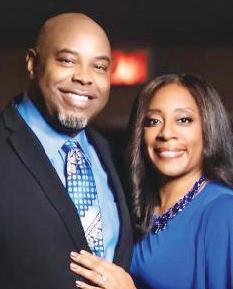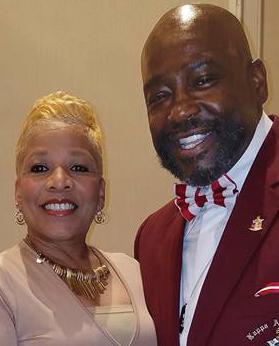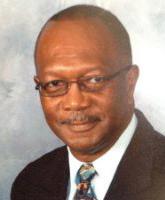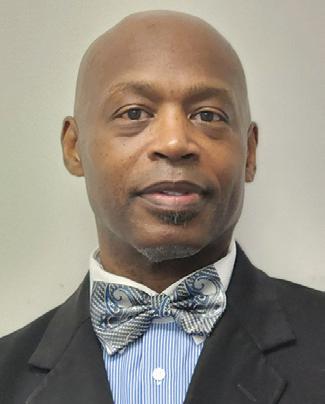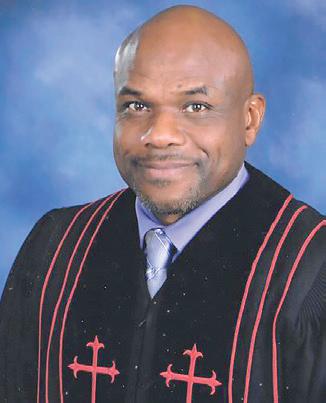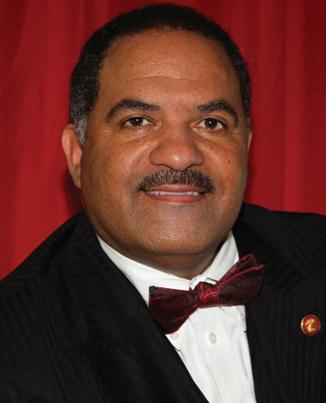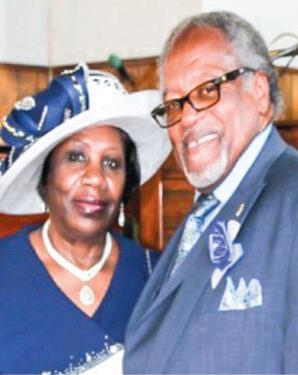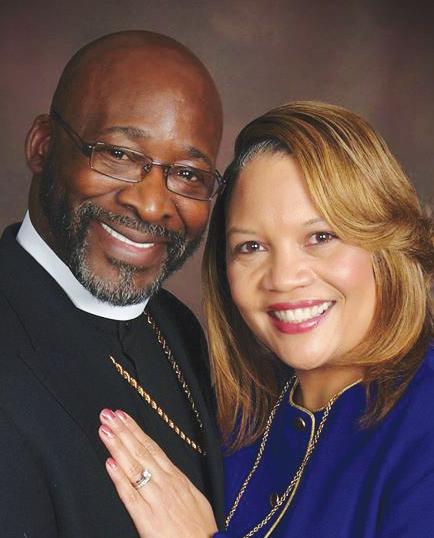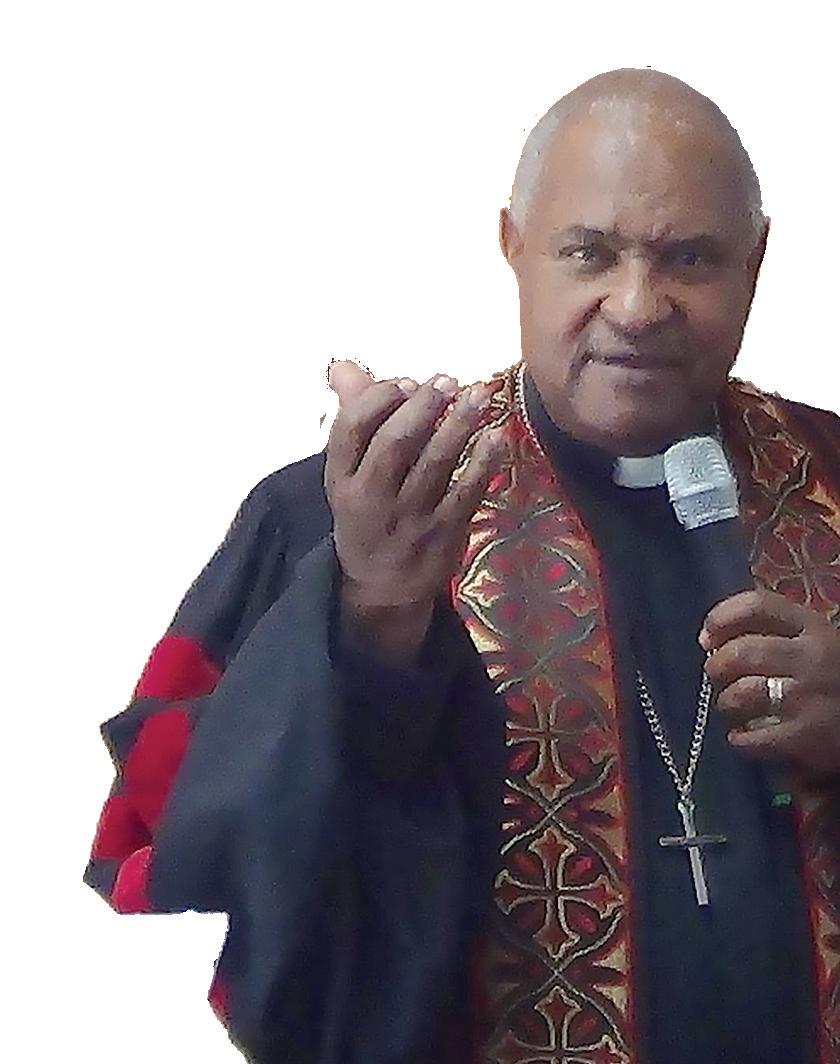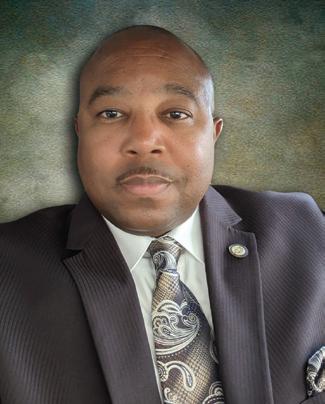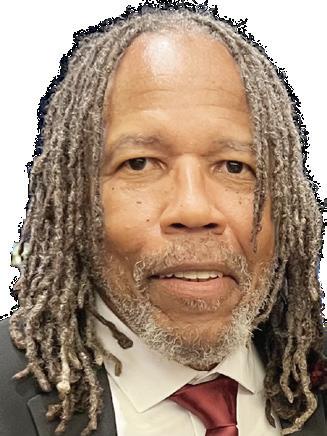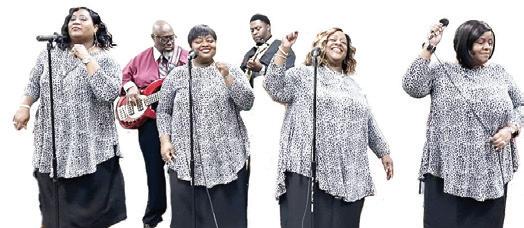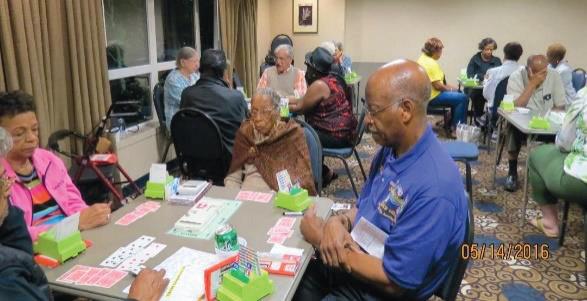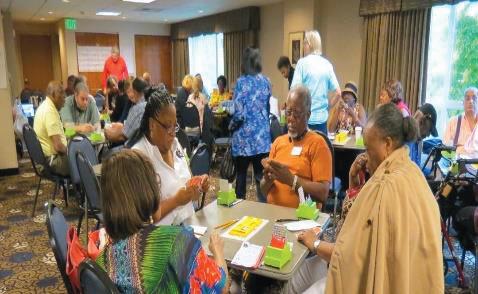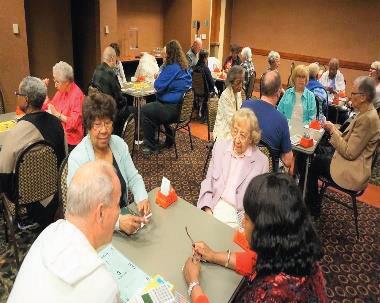
















Black and Latino workers’ job fatality rates have surged to the highest levels in nearly 15 years
By Stacy M. Brown NNPA NEWSWIRE SENIOR NATIONAL CORRESPONDENTThe AFL-CIO, a coalition representing 12.5 million workers across various unions, has released its 33rd annual report, “Death on the Job: The Toll of Neglect,” uncovering troubling racial disparities in workplace safety.
The report’s findings, based on the most recent data available, underscore the urgent need for policymakers, regulatory bodies, and employers to confront the disproportionate rates of fatalities, injuries, and illnesses faced by workers of color.

The Community Housing Working Group hosted a briefing on April 23 at Cafeteria 15L in Sacramento. Discussions focused on how the housing crisis in California affects Black and Brown communities and explored ways to provide low-income families and individuals with affordable housing. Tia Boatman Patterson, CEO and President of the California Communities Reinvestment Corporation, said “entrylevel housing” is not available as it was in the past, adding that affordable units were a major point of entry into homeownership for many families in the Black community.
See HOUSING page 2
According to the report, Black workers’ job fatality rates have surged to the highest levels seen in nearly 15 years. Meanwhile, Latino workers continue to endure the most significant risk of death on the job compared to any other demographic group. In 2022, 734 Black workers lost their lives while on the job, a significant increase from the 543 deaths recorded in 2003. Similarly alarming trends were observed among Latino workers, with the number of deaths rising from 794 in 2003 to 1,248 in 2022. Shockingly, 60% of those killed were immigrants.
See SAFETY page 2
Diversity, Equity & Inclusion workplace programs saw a meteoric rise in 2021, but now, some positions are in hot water as companies debate their efficacy and face political pressure.
 By Emily Kim Jenkins CONTRIBUTING WRITER
By Emily Kim Jenkins CONTRIBUTING WRITER


His purple hoodie read “From Baltimore, With Love” in bold, white lettering. It adorned Baltimore Mayor Brandon Scott as he appeared on the Joy Reid Show the day after the collapse of the Francis Scott Key Bridge, but specifically, he was there to address a particular comment made. A post on X (formerly Twitter) quickly spread in which Scott’s response was criticized, labeling him the “DEI mayor” and warned of things getting “so, so much worse.”
SDCCD celebrates and honors the pursuit of Black student equity
 By Macy Meinhardt VOICE & VIEWPOINT STAFF WRITER
By Macy Meinhardt VOICE & VIEWPOINT STAFF WRITER
Last week students, practitioners, and community partners associated with San Diego Community College District joined together for Black Student Success week, an annual event that celebrates the institutional commitment towards Black successes in higher education.
The theme of this year’s Black Student Success Week is Building a Better Future Together: The Urgency is Now.
See BSSW page 4
The term “DEI,” which stands for diversity, equity and inclusion, has become a highly politicized, quickly recognized acronym— almost instantaneously, Americans can recognize a user’s intended purpose behind the denoted meaning.
See DEI page 2
 By Stacy M. Brown
By Stacy M. Brown
TikTok, the clock is ticking on the popular social media app’s existence in the United States. President Joe Biden signed a bill on Wednesday approving the ban of TikTok, adding significant pressure on the platform to find a new owner.
See TIKTOK page 2




Continued from cover
“These alarming disparities in workplace fatalities among workers of color are unacceptable, symptomatic of deeply ingrained racial inequity and the need to pay increased attention to the dangerous industries that treat workers as disposable,” remarked AFL-CIO President Liz Shuler in a statement.
The revelations are particularly stark when compared to the racial breakdown of the American workforce. Recent data from the Bureau of Labor Statistics shows that as of 2021, white workers comprised 77% of the U.S. workforce, while Latino workers accounted for 18%, and Black employees represented 13%. The proportions don’t align with the rates of fatalities among workers of color.
“This report exposes an urgent crisis for workers of color and reaffirms what we’ve long known: When we talk about justice for work-
Continued from cover
“My mother bought her first house when I was in junior high. It was an 850-square foot, two-bedroom and one-bathroom house in 1978. That house cost $30,000,” Boatman-Patterson said.
“A woman working part-time at JCPenney was able to afford that house. We don’t build these types of housing now. We do not build entrylevel homeownership,” she added.
The Community Housing Working Group is a collection of diverse community organizations from across California working together to address housing challenges in their communities. The organization believes that solving the affordable housing crisis will require creating enough smaller, lower-cost, multi-family homes located near jobs, transit, and good schools.
The briefing included a panel discussion titled, “Exclusionary Zoning: A Look Back and a Path Forward.” Boatman-Patterson participated in that session along with Henry “Hank” Levy, Treasurer-Tax Collector for Alameda County, and Noerena Limón, consultant, Unidos U.S., and Board Member of California Housing Finance Agency.
Boatman-Patterson, a former Associate Director for Housing, Treasury and Commerce in the Office of Management and Budget for the Biden Administration, started her presentation by highlighting how exclusionary single-family zoning is contributing to continued segregation of California communities.
She said that single-family zoning originated in the Bay Area city of Berkeley in 1916.
Continued from cover
“What they mean by DEI in my opinion is ‘duly elected incumbent’,” Mayor Scott told Reid. “We know what they want to say, but they don’t have the courage to say the N-word.”
Jennifer Saul, Chair in Social and Political Philosophy of Language at University of Waterloo, wrote for The Conversation, “It’s hard to find a hot-button issue or social context where DEI can’t be hurled as a term of abuse to undermine marginalized people.”
Left-wing politicians argue that the right wing uses DEI as a racist dog whistle to hide hateful speech. Right-wing politicians argue that the left wing uses DEI as a way to legally discriminate. So how did it become so convoluted?
This hot-button term comes from another phrase
Continued from cover
The legislation, part of a broader foreign aid package supporting Israel and Ukraine, passed the House with a decisive 352-65 vote last week and received Senate approval on Tuesday. The Protecting Americans from Foreign Adversary Controlled Applications Act is the most severe threat to TikTok since U.S. officials first raised concerns in 2020.
Under the new law, TikTok’s Chinese parent company, ByteDance, has 270 days to sell TikTok to a non-Chinese entity. Failure to comply would result in TikTok’s removal from U.S. app stores and restrictions on “internet hosting services” supporting the platform, limiting its accessibility to new users and interactions with its content.
ers, we must prioritize racial equity,” the authors emphasized.
The report identified specific hazards and industries where workers of color are most vulnerable. For Black workers, fatalities often result from transportation accidents, homicides, or exposure to harmful substances or environments. Meanwhile, Latino workers face significant risks in industries such as construction, agriculture, and manufacturing, where workplace hazards are prevalent.
Furthermore, the report highlights the systemic challenges workers of color face in accessing adequate protections and resources. Instances of employer retaliation for reporting unsafe conditions or injuries are rampant, creating a culture of fear and silence among workers. Weak penalties and enforcement mechanisms further exacerbate these issues, failing to hold non-compliant employers accountable for endangering their employees’ lives. Despite advancements in safety regulations and enforcement, systemic issues persist, threatening the
well-being of workers across various industries. Comparing records on safety and health, the report noted that the Biden and Trump administration’s records differ drastically. The authors determined that the Biden administration’s job safety agencies have had to repair and rebuild after “four years of decimation rife with understaffing, repeal of worker safety laws, limits on public access to information and the inability to issue even the most basic of long-overdue protections.” They concluded that the Biden administration improved transparency of information about loved ones lost on the job to honor them and to prevent the tragedies for other families, bolstered enforcement initiatives to hold accountable the employers who violate the law and put workers in danger, strengthened policies to protect vulnerable workers with the greatest risks of dying on the job and facing retaliation, and issued milestone regulations to save workers’ lives and improve their livelihoods.
The authors noted that the Biden administration recently used the first action under the
“By creating single-family zoning and having fenced-off communities, you were able to exclude the ‘others,’” Boatman-Patterson said.
“It really was a method to exclude — what they called ‘economic segregation’ — but that was a guise for racial segregation. Single-family zoning, along with redlining, became a systemic approach to exclude based on affordability.”
Title VIII of the federal Civil Rights Act of 1968 — commonly known as the Fair Housing Act of 1968 — is the U.S. federal legislation that protects individuals and families from discrimination in the sale, rental, and financing of housing. It was passed to open the doors to affordable housing.
In an effort to increase the housing inventory in California to help address the state’s ongoing housing crisis, lawmakers in 2021 passed Senate Bill (SB) 9. That law allowed Californians to build up to four residential units — including triplexes, duplexes and residential dwelling units
that, although not used as frequently now, is still fairly controversial: affirmative action. The phrase “affirmative action” was first coined by a 1961 executive order by former President John F. Kennedy, which instructed government contractors to “take affirmative action to ensure that applicants are employed, and… treated during employment, without regard to their race, creed, color, or national origin.” In 1965, this was expanded to all federal government entities as Equal Employment Opportunity (EEO).
In 1978, the Supreme Court upheld affirmative action’s constitutionality, but barred UC Davis’ reserved-minority-seating program. This opinion was overturned by the Supreme Court in 2023, stating that race-based affirmative action was unconstitutional under the 14th Amendment’s Equal Protection Clause.
Affirmative action continued to be on the ballot in one form or another for California voters for years, but the usage of the term began to wane.
Biden set the sale deadline for January 19, 2025, with an option to extend it by another 90 days if progress is made toward a sale. This could grant TikTok up to a year before facing a ban.
TikTok CEO Shou Chew responded defiantly to the legislation, assuring users in a video message, “Rest assured: we aren’t going anywhere.” Chew stated, “We are confident and will keep fighting for your rights in the courts. The facts and the Constitution are on our side, and we expect to prevail.”
TikTok spokespersons criticized the law as “unconstitutional,” warning of its devastating impact on the platform’s 170 million U.S. users and 7 million businesses operating on the app.
The bill’s proponents argue that it addresses genuine national security concerns. It would allow
amended Toxic Substances Control Act to ban current uses and imports of chrysotile asbestos, after decades of weak laws and inaction that have put the United States behind other countries; issued a rule to protect communities from facilities that store, use or manufacture chemicals; clarified the rights of workers to choose their own representation during inspections; issued a rule to protect mineworkers from silica exposure; issued a rule to require large employers to fall in line with other-sized employers on injury reporting to OSHA and anti-retaliation measures for workers who report injuries; and worked across agencies to protect immigrant workers whose employers are involved in a workplace safety and health investigation.
The authors said urgent steps are needed to address the root causes of workplace fatalities, injuries, and illnesses, particularly those disproportionately affecting marginalized communities. They urged policymakers, employers, and stakeholders “to prioritize racial equity to improve workplace safety and health outcomes for all workers.”
(RDUs) — on their properties in areas that were previously zoned for single-family homes only.
Last week, a Los Angeles Superior Court Judge declared SB 9 unconstitutional. That ruling affects 121 charter cities that have their own local constitutions and want to maintain the independence and authority to make their own land use decisions.
In 1968, 65.9% of White families were homeowners, a rate that was 25% higher than the 41.1% of Black families that owned their homes, according to National Low-Income Housing Coalition. Today, those figures have hardly changed in the Black community, although White homeownership has increased five percentage points to 71.1%.
Boatman Patterson said the rate has not changed in Black and Brown communities because financing for affordable entry-level homes is almost nonexistent. The homeownership disparities contribute to the disturbing racial wealth gap in the nation, according to the National Low-Income Housing Coalition’s October 2018 report.
“We really must align the financing with the actual building of units, which we haven’t necessarily done. Because of this misalignment, I think we continue to see problems,” BoatmanPatterson said. “All these laws were supposed to address the ability to buy and purchase and to now have opportunities, but we don’t align
In 2019, a study done by Insight into Diversity found that spending on ‘diversity’ efforts had increased by 27 percent since 2014. After the murder of George Floyd in 2020, The Economist found that worldwide, new hires with ‘diversity’ or ‘inclusion’ in their job title had nearly doubled in a single year, between 2020 and 2021.
Since affirmative action has long had roots in higher education, it is no surprise that colleges and universities are at the forefront of incorporating diversity programs into their processes.
Dr. Samuel Song, an Associate Dean of Diversity, Equity and Inclusion at San Diego State University, says they’re essential to student success.
“It really benefits education. There's a lot of freedom of speech and thought… What's linked to DEI [are] changes in our educational landscape,” he said. He noted that women’s sports and Title IX came around as a result of DEI initiatives
the president, with intelligence agency input, to designate social media applications controlled by foreign adversaries as national security threats. These designated apps would then face bans unless they severed ties with foreign entities.
Despite bipartisan support for the bill, with House Speaker Mike Johnson (R-La.) describing Communist China as America’s most significant geopolitical foe using technology to undermine the U.S. economy and security, it faced notable opposition: fifty Democrats and 15 Republicans, including Reps. Pramila Jayapal (D-Wash.), Ro Khanna (D-Calif.), and Marjorie Taylor Greene (R-Ga.) voted against it.
Critics raised concerns over potential infringements on free speech and adverse impacts on small businesses. TikTok’s broad demographic
financing with what we do.”
The other key aspects of the briefing and panel discussion included the impacts of exclusionary single-family zoning on communities of color, policies to prioritize to create more equitable housing choices, and the importance of creating more housing options to drive economic mobility and increase local revenue and investment in communities.
The panelists not only brought their expertise to the conversation. They shared their backgrounds and personal experiences as well.
Limón said her father, a tree trimmer, bought an entry-level house for about $46,000. Based on that, she understood that “homeownership is foundational for wealth creation, property tax collection for the state, and to ensure that people can take out loans to send their kids to college,” she said.
“The fact that the entry-level homeownership supply is the most under-supplied units really exacerbates the prices we are seeing today,” Limón said.
The moderator for the briefing and panel was Konstantin Hatcher from California Yes, In My Back Yard (YIMBY), a statewide advocacy organization working to pass legislation to end the state’s housing shortage and affordable communities.
In closing, Hatcher said he hopes that the housing crisis in California subsides soon.
“Hopefully a decade from now we’re not having this same conversation and we have seen the needle move and that opportunities have moved evenly across California,” Hatcher said.
long before the term was popularized. In the workplace, these programs may function differently and their effectiveness is debated. According to a WebMD Health Services study, 62 percent of workers say they believe DEI programs are ineffective, while 46 percent say their employer’s program has failed them personally. A Pew Research Center study found that a narrow majority of Americans feel that DEI practices are generally good, but these opinions are highly split among demographic lines.
With the 2023 Supreme Court ruling, efficacy in the workplace in question and ten states completely barring race-based affirmative action from academic admissions, DEI has become a political battleground. After a boom in the diversity industry in 2021, criticism grew stronger and the phrase began taking on a negative connotation, especially in conservative circles.
See DEI page 18
reach was highlighted, with over 834 million global users, including 135 million in the U.S., predominantly under 20.
The legislation’s opponents, including TikTok, argue that it risks curtailing First Amendment rights and harming thousands of minority-owned small businesses reliant on the platform. The company has launched an aggressive lobbying campaign to combat the proposed legislation.
Paul Tran, co-owner of a skincare company that attributes much of its success to TikTok, said, “You will be destroying small businesses like us; this is our livelihood.” He cautioned lawmakers against undermining the American Dream cherished by many.
 By Dr. John E. Warren PUBLISHER, THE SAN DIEGO VOICE & VIEWPOINT
By Dr. John E. Warren PUBLISHER, THE SAN DIEGO VOICE & VIEWPOINT
Right now, the City of San Diego is engaged in several activities that will impact the way we all live, at least during the next calendar and budget year. Interviews are underway for a new Fire Chief. With all the talk about equity and inclusion there appears to have been few questions about the makeup of the City of San Diego Fire Department and what it will look like going forward.
While we are told there will be community hearings in several parts of the City going forward, most of us have no idea as to who the candidates are and on what basis they are being selected.
Questions: How many women and men makeup the workforce? What's the racial composition and how is recruitment being handled? Most of these questions will not be asked or answered until after the new person is hired.
Whose fault is that? Our fault as citizens in not demanding accountability.
The same questions should be asked at the County. There is a desire to have more public input in the selection process for the new County Administrative Officer. We have not had a Black Chief Administrative Officer since Clifford Graves, who was formerly with the Office of Management and Budget before taking that position. So there are African Americans qualified to do the job, but have any applied or been asked to apply? We don’t know. Again, that’s
our personal fault for not asking the questions.
Now that the Mayor’s proposed budget is out and the Independent Budget Analyst (IBA) reviews are available, it's time to look at the two documents and begin to make some recommendations to save those programs we feel are being sacrificed while some others may not feel the same levels of cuts. Both budgets are online and can be pulled up at your local library if you don’t have internet access. WE must come together now, not after the June vote on a budget you didn’t read or approve. In the end, those elected get away with what we the people allow through our ignorance and apathy.
For people of color, the crisis is even more real since we have less to start with. This paper welcomes your comments and suggestions concerning both budgets and will share those views with our readers in print and online. Please let us hear from you, the citizen and voter, before the budget is finalized and before the November election.
And the Mark Robinson Campaign for Governor
By Roger House AUTHOR AND PROF. OF AMERICAN STUDIES AT EMERSON COLLEGE
North Carolina voters are evaluating the historic candidacy of Mark Robinson, the first Black lieutenant governor, and Republican nominee for governor. If elected, he would be the first Black governor of the Tar Heel State. His candidacy has raised a good deal of controversy; however, it may offer prospects for areas of collaboration with Black faith voters as well.
Here are three reasons why the Robinson campaign may be worth a look:
First, there may be symbolic value in having Mark Robinson as the governor of a New South state.
Second, there may be an advantage in splitting the ticket and seeking leverage in both parties.
Third, there may be a need to end the tradition of relying on centrist white Democrats for representation. The authority of the office rests in its role as a bully pulpit in the political culture.
Of course, the Robinson campaign must show a willingness to envision an agenda of progress before voters can truly decide. He should under that the Black community, as a state voting bloc, is in a position to support him around programs of good works.
Among its favorable political assets are a 20 percent population, powerbase in Charlotte and church network, and in-flux of young professionals with technical skills.

The symbolic value of a Black governor is self-evident. Elected lieutenant governor in 2021, Robinson is the first to hold the office and only the second elected statewide. The potential advantages to split ticket voting relies on trust as a conduit for community concerns to the state establishment.
The community has long relied on centrist white Democrats for representation in Raleigh. In North Carolina today, there is the candidate Josh Stein, the state attorney general, who, if elected, would be the state’s first Jewish governor. This history is certainly worth making but maybe not to forgoing the election of a Black governor?
Also, it’s no secret that the election takes place in a climate of contentious interactions over the Gaza War tragedy. Most compelling was the call of 1,000 Black ministers for a humanitarian ceasefire, hostage release, and negotiations, a position increasingly promoted by the Biden Administration. It has fueled fights involving high-ranking Black figures, including primary challenges to several popular representatives, and is roiling college campuses.
The Robinson campaign has been harmed by its cultural insensitivity and political inexperience; much of the press criticism has merit but may not close the door to mutual interests. But his platform as it concerns the duties of the governor appear to be a work in progress.
In closing, before voters can decide on such matters, a lot will depend on how he can demonstrate an interest in a consensus agenda. Among the concerns are infrastructure and immigration, health care and education, voting rights and legislative moderation, and more. If there are such demonstrations, then the campaign may be worth a look by Black faith voters of the state.
 By Charlene Cromwell SENIOR FELLOW AT CENTER FOR RESPONSIBLE LENDING
By Charlene Cromwell SENIOR FELLOW AT CENTER FOR RESPONSIBLE LENDING
Each spring, many aspiring students and their families begin receiving college acceptance letters and offers of financial aid packages. This year’s college decisions will add yet another consideration: the effects of a 2023 Supreme Court, 6-3 ruling that ended the use of affirmative action. No longer can race be considered as one of many other factors to reach college admissions decisions.
“The Harvard and UNC admissions programs cannot be reconciled with the guarantees of the Equal Protection Clause,” continued the Chief Justice. “Both programs lack sufficiently focused and measurable objectives warranting the use of race, unavoidably employ race in a negative manner, involve racial stereotyping, and lack meaningful end points. We have never permitted admissions programs to work in that way, and we will not do so today.”
A strongly-worded dissenting opinion by Justice Sonia Sotomayor, challenged the majority, asserting that affirmative action remains both viable and necessary.
“This limited use of race has helped equalize educational opportunities for all students of every race and background and has improved racial diversity on college campuses,” wrote Justice Sotomayor.
“Although progress has been slow and imperfect, race-conscious college admissions policies have advanced the Constitution’s guarantee of equality and have promoted Brown’s vision of a Nation with more inclusive schools.”
“The Court subverts the constitutional guarantee of equal protection by further entrenching racial inequality in education, the very foundation of our democratic government and pluralistic society. Because the Court’s opinion is not grounded in law or fact and contravenes the vision of equality embodied in the Fourteenth Amendment, I dissent,” concluded Sotomayor.
In the aftermath of this consequential decision, as many as 30 states have now either filed or enacted new laws against teaching Black history or ‘other divisive concepts’, as well as defunding or outright ending diversity, equity and inclusion initiative. Counted among these states are Alabama, Florida, and Texas where multi-million Black residents are directly affected.
While many might presume widespread unity in Black America over the Supreme Court ruling, a survey analysis by Gallup’s Center on Black Voices published earlier this year shows a distinct and disturbing generational divide on affirmative action. Survey respondents were asked about the effect the affirmative decision may have in four specific areas:
1. Higher education in general;
2. Educational opportunities for Blacks;
3. The ability of people of one’s own race/ethnicity to attend college; and
4. Diversity of college campuses.
Numerically, 56 percent of Black adults aged 40 and older mostly view the decision negatively. But among younger Black adults, aged 18 to 39, the affirmative action reversal is viewed positively by 62 percent. Moreover, many younger Blacks anticipated the decision will have no impact at all on their educations and futures.
A coalition of 12 national civil rights advocates including the National Urban League, National Action Network, NAACP, National Coalition on Black Civic Participation, Lawyers’ Committee for Civil Rights Under Law, NAACP Legal Defense and Educational Fund, Leadership Conference on Civil and Human Rights, and the National Council of Negro Women, also said the nation’s highest court is the problem when it comes to affirmative action, saying its decision, “serves as a distressing reminder of the uphill battle we continue to face in dismantling systemic racism and the potential implications this decision can have on diversity, equity, and inclusion efforts in the workplace.”
Whatever solution(s) are needed, one thing remains clear: America’s constitution may have promised that all are created equal; but in education, the fulfillment of that promise has yet to become real.

 By Macy Meinhardt
By Macy Meinhardt
 & VIEWPOINT STAFF WRITER
& VIEWPOINT STAFF WRITER
The five day event featured a series of webinar workshops throughout the week. Labeled #TheBlackHour, the topics covered degree accessibility, AI and racial equity, affirmative action, workforce development, policies, and being on the front lines of Black student success.
This is the fourth year the week April 22-26 has been recognized by the community college district. Originally, the Black Student Success Week Coalition was established in 2020 in response to an urgent need for state leaders to take action in supporting Black students.
During the “Empowering Black Excellence” workshop, President of San Diego Community College of Continuing Education (SDCCE) Dr. Tina King, spoke on the disparities facing Black students and how institutions such as SDCCU is working “to close the gap.”
Black Learner Demographics in California’s Community Colleges
• Median household income: $24,000 vs. $39,000 for White community college students
• Experiencing Poverty: 36%
• Parenting: 40% Mothers, 21% Fathers
• Employed: 78%
• 25 and older: 52%




“As you can see, these incomes are essentially at poverty level and many below poverty level,” said Dr. King.
Based on a UNCF report, barriers to graduating from college for some African American students is evidenced by nationally low retention
rates of Black students. Among students enrolled in four-year public institutions, 45.9% of Black students complete their degrees in six years—the lowest rate compared to other races and ethnicities. Black men have the lowest completion rate at 40%.
“You are entitled to using this technology; we 100% deserve to leverage the opportunity and insights of AI,” said Dr. Jonathan Locust.
Based upon data collection, speakers also emphasized the importance of having a di-
Therefore, in commitment to ensuring that Black students have the proper tools needed to beat the statistical odds, the coalition is made up of campus and national and system leaders, faculty, and students.
verse pool of sources and minds used to develop future artificial intelligence technology.
“Representation is needed and vital in the shaping of this technology,” said Mohamed Sharif-Idiris.
“For many of us who are serving adult learners, we know that Black learners are amongst the most culturally ethnically socioeconomically and educationally diverse in the state. So shout out to the practitioners who are in the trenches developing the programs and increasing black student success.” said Dr. King.
In total there were five panels paired with watch parties at multiple SDCD campuses and follow up debriefs called #TheAfterparty.
In one of the panels, “Just Because we make it look easy doesn’t mean it is” moderators led a candid discussion on the challenges of yielding authentic change and equity within an institution. Questions posed such as “what does authentic institutional support look like to you?” prompted the group of faculty members to reflect and share successes and struggles within their pursuit of educational equity for students.
“When institutions want to authentically support communities, they must do three things. The first thing they have to do is go to the affected community and ask them what they need. The second thing they have to do is shut up and listen. Then, they need to believe them, and act based on what the community says,” said Dr. Jonathan Henderson.
Furthermore, Friday’s discussion centered on the increased implications AI may have on
Another panel discussed innovative practices that target Black student success within the intersection of policy, workforce development and apprenticeship programs. Kicking this discussion off was the Inaugural Chief Diversity and Equity Officer of the U.S. Department of Labor, Alaysia Black Hackett. Chief Hackett spoke on behalf of the Biden and Harris administration’s role in supporting the college to workforce pipeline, including the distribution of $135 million in grants to support this initiative.

Federal funding like this helps the success of training certificate programs as well as apprenticeship programs offered by San Diego community colleges as an accessible on ramp to the workforce. For example, SDCCE offers 70 career training certificate programs in high demand sectors, specifically developed for low income veterans, first generation immigrants, refugees and asylum seekers students.
Apprenticeship programs on the other hand, are work based learning programs that give students on the job training and help with direct job placement. Since the start in 2021, to this day the program has served 11 cohorts, enrolling over 194 students.
“What we’re most proud about and excited to share for me, is that a quarter of our students, 25% of participants, are black students. So 25% far exceeds the black representation in San Diego which is only 6% of the San Diego city population,” said Dr. King.
Wrapping the fourth year of honoring Black students, the week was filled with a myriad of insight, bonding, tool building, and innovation along the imperative mission of cultivating Black excellence in higher education.
Macy Meinhardt is a part of the inaugural


Mo narch School Project – a leading nonprofit provid ing youth and their families experiencing homelessness with aca demic and social growth, emotional support and life skills designed to help them succeed – has been awarded the 2024 Director’s Community Leadership Award by the FBI’s San Diego field office.
Stacey Moy, Special Agent in Charge of the San Diego Field Office presented Monarch School Project leadership with the award during a private ceremony at the San Diego FBI field office held in March, and organization leader ship was honored at another cer emony in Washington, D.C. at FBI Headquarters on Friday.
The FBI created the Director’s Community Leadership Award in 1990 to honor dedicated individuals and organizations from across the country for their extraordinary contributions to strengthening communities and reducing crime and violence. Every year, field offices select recipients for this award on behalf of the FBI Director to recognize their tremendous support.
“Thousands of youth in San Diego are dealing with complex trauma and the stress of homelessness on a daily basis. This recognition further highlights the importance of the work we’re doing, a model we will help other schools and organizations to replicate nationwide,” said Afira Devries, president and CEO of Monarch School Project.
Monarch School Project, which operates Monarch School in the Barrio Logan neighborhood, was selected for the award in San Diego for its work with unhoused youth and their families. Because of the unique needs of the youth it serves, Monarch School Project’s approach focuses on helping students gain skills they need to improve their lives, develop awareness of their emotions and healthy coping skills, explore their passions and plan for a self-sufficient life. Monarch School Project has created a model educational foundation for schools nationwide so they can provide a better safety net for children whose families are experiencing homelessness.
For more information about Monarch School Project’s leadership, programs, volunteer opportunities and impact on San Diego’s unhoused community and beyond, visit monarchschools.org.
Aims to ensure eligible victims have needed resources
VOICE & VIEWPOINT NEWSWIRE VOICE & VIEWPOINT NEWSWIRE VOICE & VIEWPOINT NEWSWIRE
In order to provide more options to quickly and cost-effectively repair damaged roads, the City of San Diego’s Transportation Department has implemented two new street resurfacing methods and work is currently underway in Kensington, Talmadge, Grantville, San Carlos, North Park, Bay Park and several other communities.
The new slurry-like sealing methods, called cape seal and scrub seal, are commonly used treatments and will help extend the life of roads by filling cracks, protecting against moisture incursion and minimizing the development of potholes and other surface deformities.
• Augustana Place
• Austin Drive
• Atlanta Drive
• Baylor Drive
• 58th Street
• Adelphi Place
• Antioch Place
• Collier Avenue
• Adams Avenue
• Olympic Place
• Olympic Street
• 69th Street
• Racine Road
• Zena Drive
• Vista Grande Drive
• Kensington Drive
• University Avenue
• Fairmont Avenue
• 41st Street
• 43rd Street
• Krenning Street

• El Cajon Boulevard
• Montezuma Road
• Morning Mist Court
• Suntree Place
• Cowles Mountain Boulevard
• Bisby Lake Avenue
• Beaver Lake Court
• Beaver Lake Drive
• June Lake Drive
• Lake Decatur Avenue
• Lake Dora Avenue
• Badger Lake Avenue
• Budlong Lake Avenue
• Rainswept Lane
• Rainswept Way
• Crystal Lake Avenue
• Merced Lake Avenue
• Glenlea Lane
• Overlake Avenue
• Ridgemoor Drive
• Crystalaire Drive
• Adobe Falls Road
• Ward Road
• Rancho Mission Road
• Vandever Avenue
• Seaman Street
• Glacier Avenue
• Gramercy Drive
• Aero Drive
• Ilion Street
• Tokalon Street
• Fairfield Street
• Castle Hills Drive
• Cassandra Lane
• Foothill Boulevard
• Turquoise Street
• Jumano Avenue
• Cecelia Trail
• Garfield Road
• Milton Court
• Penrose Street
Continuing its long history of leadership in violent crime victim services, the California Victim Compensation Board is marking National Crime Victims’ Rights Week (April 21-27) by launching a new awareness campaign - CalVCB Can Help You Rebuild - designed to support victims of violent crime in getting the help they need to rebuild their lives. This campaign is a key facet of the organization’s focus on ensuring victims of violent crime know that compassionate help is available in multiple languages and in communities across the state to help victims on their journey toward rebuilding.
According to FBI data, a violent crime occurs every 26.2 seconds in the United States, leading to a cascade of associated physical, mental, and financial impacts on the victim and their family. Last year, CalVCB provided nearly 30,000 victims with more than $44 million in assistance.
CalVCB Online allows crime survivors, their friends and family, or a victim advocate to apply for reimbursement compensation from a smartphone, tablet, or computer. Online resources are available in English and Spanish and help is also available via phone in all the major languages spoken in California.
CalVCB pays victims back for eligible crime-related expenses to help
Cape seal treatment involves the application of asphalt emulsion followed by a layer of crushed rock that must cure for three days before a slurry seal is applied. During the three-day curing period, some loose crushed rock will be on the roadway surface until the final slurry seal application is complete.
During the process of both the cape and scrub seal, the selected street will be closed to all traf-
• Dunhaven Street
• Northaven Avenue
• El Mac Place
• John Street
• Moana Drive
• Temple Street
• Hill Street
• Osprey Street
• Tivoli Street
• Seville Street
• Shadowlawn Street
• Locust Street
• Malaga Street
• Madrid Street
• Meadow Grove Drive
• Michaelmas Trail
• Coronado Avenue
• Orchard Avenue
• Long Branch Avenue
• Leland Street
• Worden Street
• Evergreen Street
• North Evergreen Street
• 1st Avenue
• 2nd Avenue
• 6th Avenue
• 7th Avenue
• 8th Avenue
• Alcorn Place
• Alleghany Street
• Alma Place
• Altamont Drive
• Altamont Way
• Arizona Street
• Bancroft Street
• Blackstone Court
• Briarwood Road
• Britannia Boulevard
• Brookes Avenue
• Calle Chanate
• Calle Tortuosa
• Chadwick Avenue
VOICE & VIEWPOINT NEWSWIRE
Hate littering, or distributing flyers, posters, or symbols with hateful messaging targeting protected communities, has become more prevalent in recent years. Assemblymember Chris Ward, joined by San Diego City Councilmember Raul Campillo, San Diego Mayor Todd Gloria, and San Diego City Attorney Mara Elliott, announced new legislation to address this practice with AB 3024: The Stop Hate Littering Act.
“These are deliberate, targeted attacks that
are intended to harass and intimidate victims, dehumanizing them based on their religion, gender or sexual orientation, or other characteristic,” said Assemblymember Ward.
According to the Anti-Defamation League, the spread of anti-Semitic flyers is part of a rising trend of anti-Semitic hate. The organization found that in 2023, there were more than 3,600 anti-Semitic acts of assault, vandalism and harassment in the United States — at least eight instances of anti-Semitic flyers being distributed on car windshields in San Diego neighborhoods were documented in 2023.
The Stop Hate Littering Act will make necessary updates to existing law by building on the Ralph Act of 1976 to ensure victims are provided adequate protections, civil recourse, and create new legal tools for law enforcement to hold offenders accountable and deter hate act activity.
victims rebuild their lives. Eligible expenses include medical, dental, or mental health services, lost income due to death or disability, funeral/ burial expenses, crime scene clean up, relocation, and home security expenses. Victims must be California residents or in California at the time of the crime. The benefits can cover the victim as well as some expenses for direct family members or others like roommates or caretakers who may have been affected by the crime.
Victims have up to seven years to apply for benefits but should apply as soon as they are ready. Once approved, benefits are lifelong up to certain benefit caps.
The average processing time for completed applications is just 45 days and an average of 80% of applications are approved. The CalVCB website directs victims to community resources such as victim advocates, local resource centers, legal services, or healthcare services that can provide help and support through the application process. All services are confidential and applications have no direct impact on immigration status. To learn more about CalVCB, visit victims.ca.gov.
fic and “No Parking” signs will be posted 72 hours in advance of construction. Explanatory signs will be posted on the street, as well as flyers distributed to nearby residents. All vehicles left on the street in violation of the signs will be towed. During the curing process, signs will remind drivers to drive slowly and cautiously over the freshly applied aggregate rock on the roadway surface.
The latest work as part of Surface Seal Project 2421 and 2422 will be completed, weather permitting, through the months of April and May. The following roads will be resurfaced:
• Childs Avenue
• Cleveland Avenue
• Clinton Street
• College Avenue
• Date Street
• Division Street
• Dublin Drive
• Harding Avenue
• Homedale Street
• Homesite Drive
• Illinois Street
• Jason Street
• Landscape Drive
• Leghorn Avenue
• Mchaney Court
• Meadowbrook Drive
• Ocean View Boulevard
• Olivewood Trail
• Panasonic Way
• Petal Drive
• Picador Boulevard
• Plateu Drive
• Plaza Boulevard
• Potomac Street
• Rancho Hills Drive
• Reo Court
• Reo Drive
• Rustic Drive
• S 38th Street
• Saipan Drive
• San Mateo Drive
• Schuyler Street
• Sea Breeze Drive
• Signal Avenue
• Southlook Avenue
• Spruce Street
• Superba Street
• Superior Street
• Talbot Street
• Viewpoint Drive
• Waterville Road
“Distributing hate literature is an affront to the principles of respect, inclusivity and diversity that define our city and state — and that we must work to protect,” said San Diego Mayor Todd Gloria.
To explore the historical significance of Cinco De Mayo, we step back to the origins of the commemoration, share how some Mexican American Californians regard it and trace how it has morphed into the celebrations we see today.
Celebrations in the United States began in 1862 in Columbia, California, a small town located in the foothills of the Sierra Nevada in Tolumne County, according to that town’s website. Today, millions of Americans celebrate Cinco De Mayo annually with 120 official celebrations organized across the United States.
This day has become a cultural point of pride for Mexican Americans and other Latino communities in the United States. It serves as a time to affirm and celebrate their cultures with other Americans of all backgrounds as they highlight their contributions to American history and society.
Joseph Soltero, a Mexican American living in Escondido, shared his perspective on Cinco de Mayo with California Black Media. He learned about Cinco De Mayo from his grandfather and talked about the extent to which his family and San Diego County community celebrate the holiday.

“We knew September 16 was really Mexican Independence Day, but kids in my school would always mistake Cinco De Mayo as our Independence Day. [Cinco De Mayo] is not really even a Mexican holiday,” said Soltero. “It’s something people do to have an excuse to buy drinks, have fun and spend a little money at taco shops.”
Soltero’s Grandfather always made sure the family understood the historical importance of the day to Mexicans and Mexican American immigrants, but it was never a point of emphasis when it came to celebrating the holiday as a family. Other traditions were more important to them.
“It’s the Mexican version of Saint Patrick’s Day. Everybody is White and Irish on that day, and everyone is Mexican on Cinco De Mayo. It’s never been what Día De Los Muertos is to us. We celebrate the day of the dead. That is honored, that’s a tradition. Cinco De Mayo is just another day.”
Soltero believes that the best way for people to celebrate the ‘holiday’ is to educate themselves on what really happened on Cinco De Mayo.
“I would love for people to do actual homework on it. Go still support us. Go to our stores and visit our restaurants -- minus the ponchos
and sombreros. Go spend money while you’re in that community, go learn while you’re in that community, engage when you’re in that community. Don’t just eat and forget about us on the 6th.”
Like Soltero, many Mexican Americans (and other Latino Californians) do not take the support and solidarity they receive from people of other races on Cinco De Mayo for granted. They also appreciate when people take the time to learn about the cultural significance of the day and avoid some of the cultural tropes that can easily whisper undertones of racism.
To help raise your awareness about the origins and cultural significance of the day, here are 5 little known facts about Cinco De Mayo:
1. Cinco De Mayo is not Mexican Independence Day. It is the anniversary of the Battle of Puebla. This military victory on May 5, 1862, over the French forces of Napoleon III was hailed as a symbol for Mexican resistance to foreign influence.
2. The holiday was not given much historical significance outside of Puebla, and it has not been celebrated on a large scale in Mexico. However, during the Civil War, Mexican Americans in California, Oregon and Nevada who supported the Union drew inspiration from the victory over the Frenchbacked Confederate forces.
3. T he Chicano civil rights move -
ment in the 1940s gave a new energy to celebration of the holiday in the United States as a symbol of national pride.
4. I n the 1980s and 1990s, beer companies’ marketing strategies targeted Mexican Americans by encouraging them to celebrate their heritage – and Cinco De Mayo --with Coronas, Bud Light, and Dos Equis. This created the perceived connection between Cinco De Mayo, alcohol, and merrymaking.
5. L os Angeles hosts the largest Cinco De Mayo celebration in the country.
As we join Mexican American Californians to celebrate Cinco De Mayo next week, let’s deepen our cultural understanding.
With a greater knowledge of its history, we can approach our celebrations with more appreciation. Let’s use this occasion to commit to learning more about our neighbors, colleagues and friends of other races and ethnicities.
This resource is supported in whole or in part by funding provided by the State of California, administered by the California State Library in partnership with the California Department of Social Services and the California Commission on Asian and Pacific Islander American Affairs as part of the Stop the Hate program. To report a hate incident or hate crime and get support, go to CA vs Hate.
State Superintendent of Public Instruction (SSPI) Tony Thurmond is advocating for comprehensive training for teachers in reading and math, emphasizing the urgent need to improve student academic outcomes across California.
On April 24, during testimony in the Senate Education Committee, Thurmond backed Senate Bill (SB)1115, which aims to provide evidence-backed educator training. The committee passed the bill with a 7-0 vote.
Thurmond pointed out to the committee that existing funding for educator training in literacy and math only covers about one-third of California’s educator workforce. SB 1115, Thurmond said, would fund the remaining two-thirds.
“This is an issue of moral clarity,” according to Thurmond. “In the fifth-largest economy in the world, and in an age when we have access to substantial brain science about how students learn, it should be unacceptable to
train only some educators in the best strategies to teach essential skills.”
SB 1115 incorporates multiple researchbacked methods, including phonics, and it aligns with the California ELA/ELD Framework, which encourages biliteracy and multilingualism.
Thurmond emphasized the moral imperative behind the push for enhanced training by noting that 70% of incarcerated adults struggle with reading or are illiterate.
“Every child should feel supported as they learn to read and every teacher should feel confident in their ability to support students’ foundational literacy," Thurmond said. “SB 1115 is about ensuring that all children have the opportunity to read by third grade, and that all children have a shot at the life-changing outcomes that come from early literacy.”
The next step for SB 1115 is a hearing in the Senate Appropriations Committee on May 6.
Last week, California Gov. Gavin Newsom declared April 24 as “a day of remembrance of the Armenian genocide.”
This proclamation marks the first holiday honoring the victims and survivors of the systemic genocide of the Armenian people by the Ottoman Empire on the same day in 1915.
The genocide targeted Armenians, who were a minority group that were forcefully deported and killed in the early 20th century.
“We honor the strength and resilience of the Armenian people, who have built new lives and thriving communities in all corners of the globe,” the proclamation stated.
The genocide resulted in the deaths of over 1.5 million Armenian men, women, and children. This great loss suffered by the community led to the displacement and deportation
of many families, many of whom settled in California for refuge.
The declaration noted that the state government is committed to protecting the safety and wellbeing of the Armenian community. The state government has taken action to address racial, ethnic, and religious hate through reinforced security at houses of worship, and cultural centers. The state has also implemented a comprehensive “Stop the Hate” program that promotes tolerance and support for victims. An anonymous hotline and internet resource have also been set up to report for victims and witnesses of hate acts.
The California Armenian Legislative Caucus Foundation sponsored an educational lunch to commemorate the 109th anniversary of the genocide.
California Senators Alex Padilla and Laphonza Butler Back Local News Resolution
Last week, California U.S. Senators, Alex Padilla and Laphonza Butler, both Democrats, announced their support for a resolution that recognizes the significance of local news.
In the resolution dated April 23, Padilla and Butler joined Senator Brian Schatz (D-Hawai'i) and 10 other colleagues in designating April as “Preserving and Protecting Local News Month.”
The resolution acknowledges that local news outlets are a public good essential to preserving America’s democracy.
“Millions of Americans count on the local news to help them understand what is happening in their neighborhoods and around the country. Yet local newsrooms have suffered from some of the harshest layoffs and budget cuts in recent years,” Butler said in a statement.
“It is critical that we recognize the role our local press plays in keeping people informed on the world around them,” she said.
The resolution comes at a crucial time in the media industry when employment decreased by 26% nationwide between 2008 and 2020, according to supporters of the bill. Employment in the newsroom came with great uncertainty as more than 30,000 jobs were lost in the last two decades.
Sen. Schatz said that local news helps increase civic engagement and strengthens democratic norms and practices. This resolution will help local journalists maintain healthy and vibrant communities through valuable storytelling.
Gov. Gavin Newsom and Attorney General Rob Bonta announced last week that they are backing a bill introduced by the state legislative women’s caucus that allows Arizonabased doctors to provide abortion care in California to patients from Arizona.
Senate Bill (SB) 233 was authored in response to the Arizona Supreme Court’s decision on April 9 that an 1864 ban on abortion in the state is enforceable. The bill also aims to counter growing support for anti-abortion legislation in states with Republicanmajority legislatures since Roe v. Wade was overturned, according to supporters.
“California will not sit idly by. We’re urgently moving legislation to allow Arizona doctors to
provide safe and reliable reproductive care to Arizonans here in California,” Newsom said.
Sen. Nancy Skinner (D-Berkeley), chair of the California Legislative Women’s Caucus said that abortion bans are based on laws that set women back to a time when they had limited human rights.
“Anti-abortion forces have resurrected a dead law passed at a time when women couldn’t vote and husbands beating their wives was lawful,” Skinner said.
On April 24, the Arizona House of Representatives voted to repeal the 1864 abortion ban. It now moves to the Arizona Senate for deliberation.

Three officers who received suspended jail sentences over their violent assault of a French Black man are symbols of out of control racist police violence tolerated by the government in France.
The officers were convicted on Jan. 19 of “voluntary violence” towards the youth worker in Aulnay-sous-Bois, a working class suburb with a large immigrant population.
The victim, Theodore Luhaka, was left disabled with a ruptured internal sphincter and a 10 centimeter lesion of the anal canal in a case parallel to that of Abner Louima in 1997. Luhaka, 22, was also beaten in the head and face during the police identity check on February 2, 2017.
After more than nine hours of deliberation, the court found officer Marc-Antoine Castelain guilty of an offense rather than a crime, having refused to recognize the victim’s ‘permanent disability.’ He received a 12-month suspended prison sentence and a five-year prohibition from exercising his profession in public. His colleagues Jeremie Dulin and Tony Hochart received threemonth suspended prison sentences.
Thibault de Montbrial, lawyer for Castelain, described the verdict as a “huge relief.” “For the first time, in the eyes of France, it has been established that ... he is not a criminal as he has always maintained,” he was quoted to say.
Prosecutors had asked for a three-year jail term for Castelain for dealing the blow and
six and three months for Dulin and Hochart respectively for taking part in the assault.
The court rejected the charge of "deliberate violence resulting in permanent mutilation or infirmity."
Luhaka, now 29, said his ambition had been to become a professional soccer player, and he was about to join a Belgian third-division club that had scouted him when his life was thrown into turmoil, according to Henri Seckel of the Le Monde newspaper.
Police watchdog body IPGN concluded before the trial that there had been a "disproportionate use of force" and that the baton blows were inflicted at a time when "Luhaka was not attacking the physical integrity of the police officers."
Castelain said his baton blow was "legitimate" and had been taught at the police academy. The other officers kneed, punched and aimed pepper spray at Luhaka while he was handcuffed and on the ground. Officer Dulin claimed he did not mean to use the pepper spray.
Most recently, the shooting death of Nahel Merzouk, a 17-year-old French citizen of North African descent, during a police ID check last June touched off days of rioting around France. The officer who fired into the stopped car driven by the young man has been charged with voluntary homicide but was released from detention during the investigation.
Police carry out nearly 14 million identity checks in France every year. A young Black or Arab person is 20 times more likely to be stopped by police, according to a study by the French group Defender of Rights.
In Ivory Coast's Main City Over Alleged Health Concerns
Thousands are homeless
By Toussaint N’gotta PressDame Touré rushed to quickly gather what she could as bulldozers rolled into her neighborhood in Ivory Coast's fast-growing economic hub of Abidjan. Her three children joined her, stuffing plastic bags with clothes and whatever other items they could grab, before their home was reduced to rubble as armed security forces looked on.
The Touré home was among hundreds crushed in a February wave of demolitions targeting Abidjan's underdeveloped areas. The government says it's because of public health concerns as the poor areas — built along a lagoon in this port city of 6.3 million on West Africa's southern coast — suffer deadly floods during the rainy season. More than 300 people have been killed since 2005 and officials say the deluges become breeding grounds for water-borne and other diseases.
Demolitions in low-income neighborhoods are nothing new in Abidjan, where rapid urbanization has led to a population boom and housing shortages, with nearly one in five Ivorians residing in the city. It’s a chal -

 By Edith M. Lederer Associated Press
By Edith M. Lederer Associated Press
The U.N. envoy for Libya, Abdoulaye Bathily, lashed out at the country’s feuding parties and their foreign backers at a U.N. Security Council meeting Tuesday and then confirmed he had submitted his resignation.
The former Senegalese minister and U.N. diplomat, who has held the job for 18 months, said he had done his best to get the five key political actors in Libya to resolve contested issues over electoral laws and form a unified government to lead the country to long-delayed elections.
But Bathily said his attempts “were met with stubborn resistance, unreasonable expectations and indifference to the interests of the Libyan people.” And he warned that these entrenched positions, reinforced by “a divided regional and global landscape,” may push Libya and the region to further instability and insecurity.
The U.N. envoy, clearly frustrated, also warned that oil-rich Libya “has become the playground for fierce rivalry among regional and international actors motivated by geopolitical, political and economic interests as well as competition extending beyond Libya and related to its neighborhood.”
Bathily did not inform the Security Council either at the open meeting or the closed session that followed that he had submitted his resignation, council diplomats said.
In response, Libya’s east-based parliament appointed a rival prime minister, Fathy Bash-

lenge in many parts of Africa where economic woes pushed more people into cities in search of better opportunities, straining an already overstretched infrastructure.
Analysts say many African governments struggle to manage population explosions in cities and meet growing infrastructure needs.
Chimezie Anajama, a policy researcher and founder of Blooming Social Pen development nonprofit, says few administrations have managed to solve the developmental problem. "There must be a strong commitment by different African governments to come up with creative solutions to address
the infrastructure gaps in African cit ies,” Anajama said.
Some 35% of Ivorians are poor. Water shortages are a daily curse, with many forced to fetch water from streams for their daily needs. The country has also had to contend with other challenges, such as jihadi attacks that have spread to coastal states in West Africa, including Ivory Coast.
“The aim is to provide a decent ... living environment for these people,” the Ivory Coast's communications minister, Amadou Coulibaly, has said of the demolition campaigns.
Many families, however, remain homeless, stranded in several parts of the city.
The demolitions are being carried out in “a brutal manner ... causing disastrous consequences for many families already vulnerable,” the Ivorian League for Human Rights said in a statement. It urged authorities to halt the campaign.
Among those affected by the demolitions were nearly 2,000 schoolchildren of Cha Hélène College in the Yopougon neighborhood, which was reduced to rubble in February. The school was not informed it would be demol-
agha, but suspended him in May 2023. The powerful military commander Khalifa Hifter continues to hold sway in the east.
Libya’s strategic location on the Mediterranean, and the political chaos, have made the country a major route for African migrants trying to get to Europe and human smugglers. The Islamic State and other extremist groups also exploited the chaos and while some are in prison in Libya they remain a threat, especially from its restive western and southern borders where these groups have gained support.
Over the last month, Bathily said, the situation in Libya has deteriorated as a result of two major factors. The first is “the lack of political will and good faith by the major Libyan actors who are comfortable with the current stalemate, which has been going on in Libya since 2011,” he said. The second is the ongoing scramble for Libya’s territory that has made it a battleground for different foreign actors and Libyan armed groups, he said.
The Security Council also has “a moral responsibility” to end the crisis by telling everybody – the “so-called national leaders” in power today and their foreign backers – to let the Libyan people have the opportunity to chart a new course through elections and rebuild the country, Bathily said.
Bathily also stressed that peace and stability in Libya is critical for the stability of neighboring western Sahel and the wider region. “More than ever, the renewed and coordinated commitment among regional and international actors is imperative,” he told the council.
ished — neither by the Ivory Coast’s ministry of construction nor the national education ministry, said Sévérin Okpo Abe, the school's founder. The children were eventually enrolled in other nearby schools.
The evictions broke up families and the homeless were scattered across the city, said Aimée Ouédraogo. “We no longer have a home, we no longer have our family, we no longer have our children next to us.”
Ivory Coast President Alassane Ouattara has asked Abidjan's local authorities to “show solidarity … to preserve cohesion and social peace.” However, city's officials say the dem olitions are part of a broader project to reconstruct and provide basic amenities in the areas. Plots of land would be leased to those evicted for up to 25 years, for about $16 a month, they say.
On April 8, the government announced it's started to compensate affected households and that each would get about $405 to support the relocation. In a country where the minimum wage is about $121 a month, some believe it's not enough to afford the growing cost of housing. “All displaced people will receive the necessary support for their relocation,” said Belmonde Dogo, the minister in charge of efforts to alleviate poverty.



he Bayview MLK Center was the place. April 27th was the date. A classic men’s fashion review was the experience, and scholarships was the reason.
A host of sharply dressed men were strutting their swag on the catwalk in front of an audience of enthusiastic and curious lookie-loos.
The attendees were able to fine dine on some Felix's “BBQ with soul” cuisine.They were also treated to a martial arts demonstration by instructor Master Ray Leal and Master Dennis Newsom, and his class of Afro-Brazilian Capoeira students.
The students were able to excite the crowd with their martial arts acrobatics and choreography.
Tracksuits to flashy tailor made suits, custom made brims, and Stacy Adams’ shoes were all


on display in a wide variation of colors, patterns, and materials.
The stylish hunks definitely did their part in helping to raise some much needed scholarship income for community high school seniors in need of a financial pick me up.
Lamplighters board member Mrs. Ann Carroll said, "The men did a great job, I hope they had fun." She also talked about the direction of their scholarships. "We specialize in scholarships for kids that want to attend trade school like mechanics, barbers, cosmetology, stuff like that, and more."
"Everybody doesn't want or need to go to an academic based school," concluded Mrs. Carroll.
It was a ‘Mission Accomplished’ for the Legendary Lamplighters and Citizens Supporting Education at The Bayview Baptist Church Martin Luther King Center.










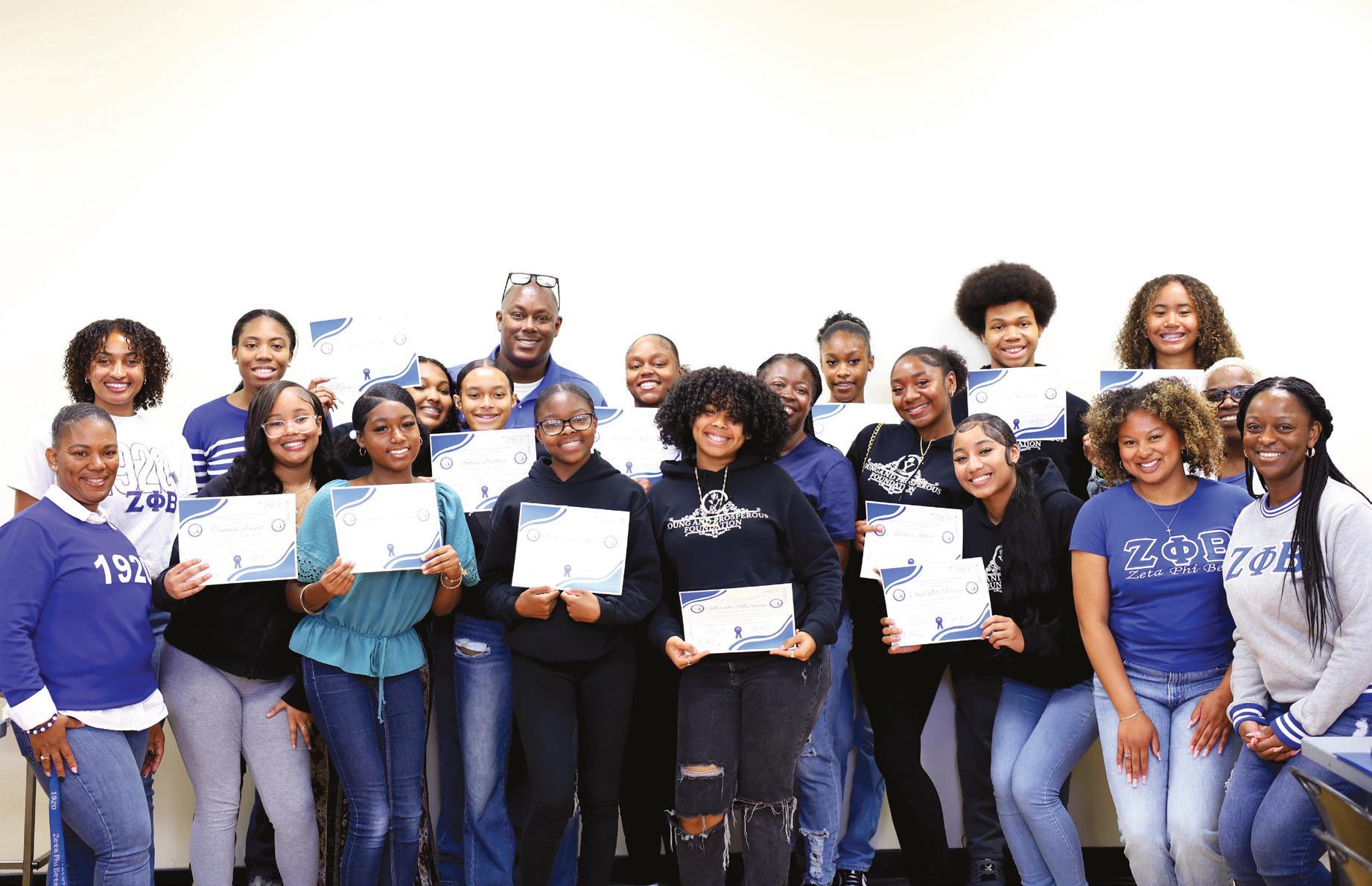



The power of change starts and ends with the youth! On April 27th, the Mu Sigma Zeta chapter of Zeta Phi Beta Sorority Incorporated hosted a scholarship application workshop at the George L. Stevens Center in San Diego. The sorority offered two separate workshop dates to give everyone in the community a chance to come and learn about the college application process, as well as what they can expect on campus, and how they can fully optimize their college experience.
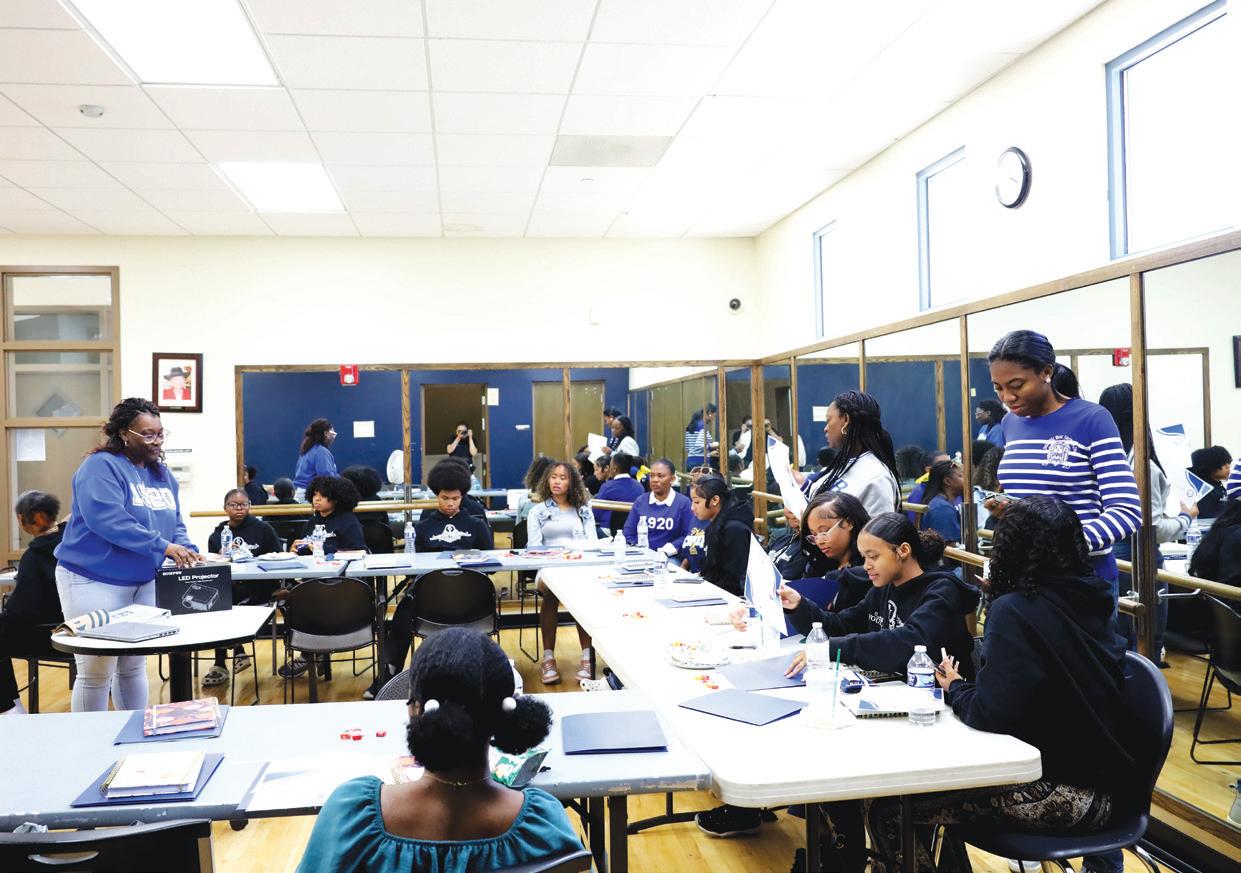
The Finer Foundations Scholarship Application Workshop is curated with high school juniors and seniors in mind. While the college applications process can be both tedious and intimidating, the ladies of Zeta Phi Beta broke the details of applying to college down in a way that was easy to receive.

During the workshop they covered everything from what to include in your entry essay, to when to submit applications, how to submit them, and which extra curricular activities to include on your resume when submitting.
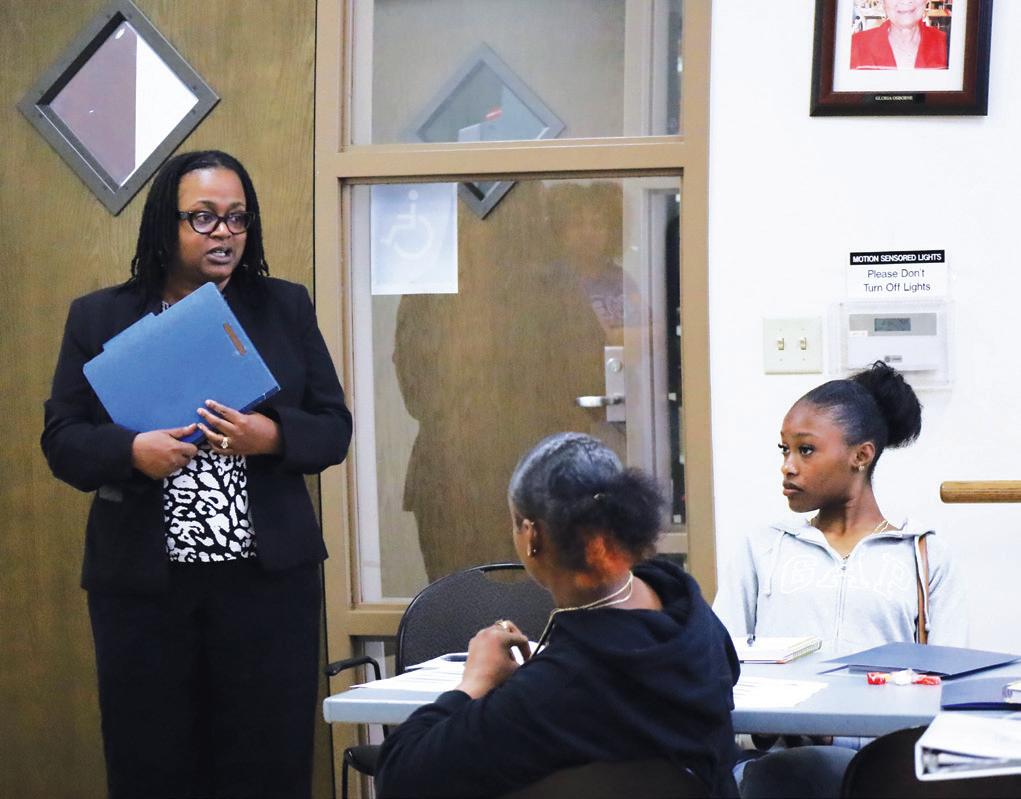
“Our goal is to really teach these students how to not only apply for college, but how to sustain when they get there. We want them to feel supported and to have the knowledge they need to be successful after they’re accepted to college too. We want them to do well ”, said one soror.
After the group explained the application process, two of the members of Zeta Phi Beta who currently work as a teacher and counselor went into further detail about how students can suc-
cessfully navigate everything from selecting a major and housing arrangements, to how to listen to their bodies and minds when things become challenging when mental health and burnout come into play.
At the end of the workshop they gave a $250 book scholarship to the senior who attended the workshop and wrapped things up with a powerful round of affirmations and thank you’s from each attendee. The Finer Foundations scholarship application workshop is doing a great job guiding the youth!
On Saturday, April 27th, DeTOUR Empowers, a nonprofit that focuses on increasing access to






education and employment opportunities for girls of color, hosted the Focused and Naturally Confident Youth, F.A.N.C.Y. , Teen Girls EXPO event at KIPP Adelante Preparatory Academy, just behind the Jacobs Center for Neighbor-





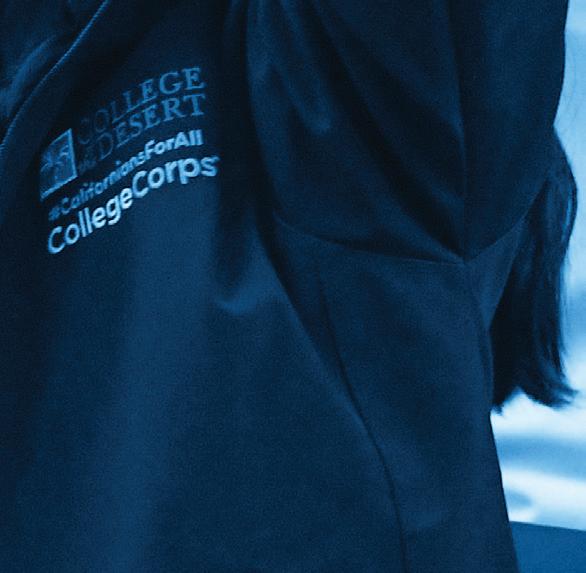
hood Innovation. Vendors, exhibits, workshops, demos, food, and fun for elementary, middle, and high school girls were designed to motivate and achieve academic excellence for young girls, provide a source of education, allow a platform for exploring career/academic interests, and provide the essential skills needed to become commu nity leaders.

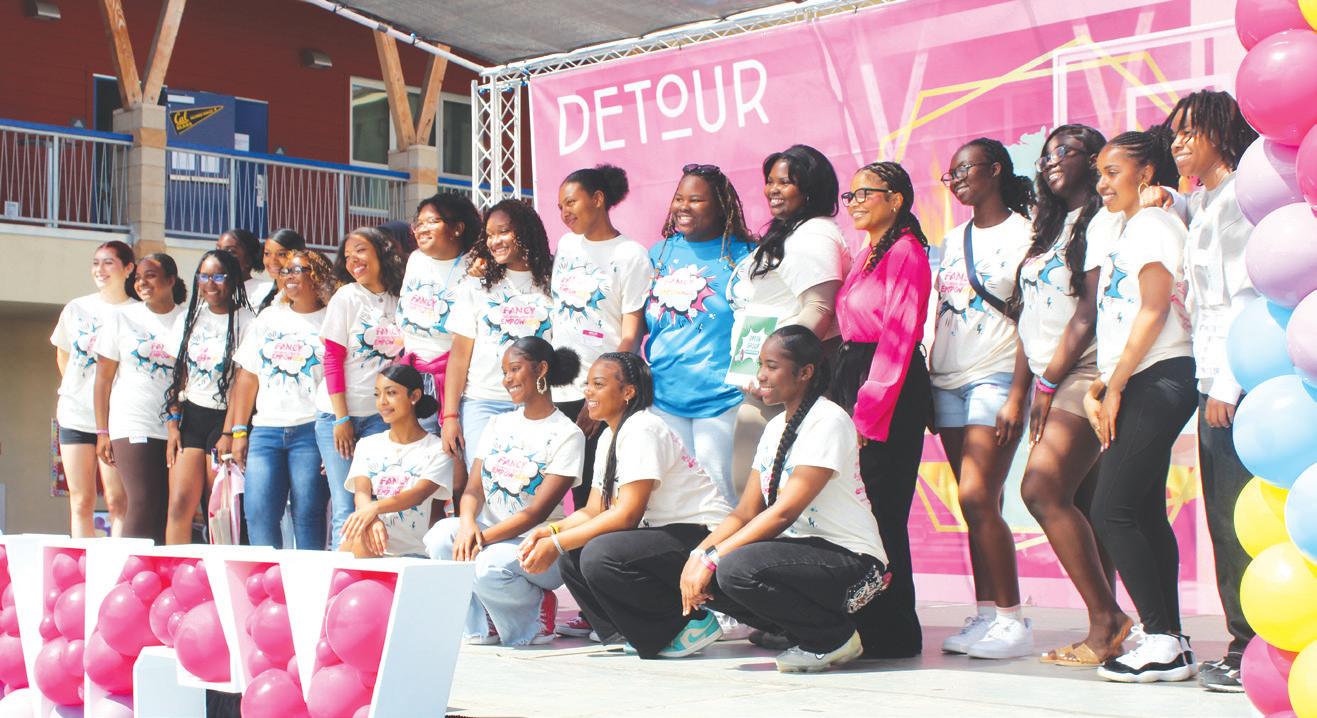

Tinesia Conwright, founder and executive director of DeTOUR, welcomed and started the event by hyping up the girls with boisterous energy, getting them and parents excited for the fun-filled day prepared for them! She introduced alumni and the F.A.N.C.Y. Teen Girls that helped her execute the event, along with Congresswoman Sara Jacobs, whose speech invigorated and inspired the need for young leadership in the community. “We need you guys, we need you right now! I think you guys really know what we need in our country and in our world right now. We need your creativity to make the world a better place”, said Jacobs.
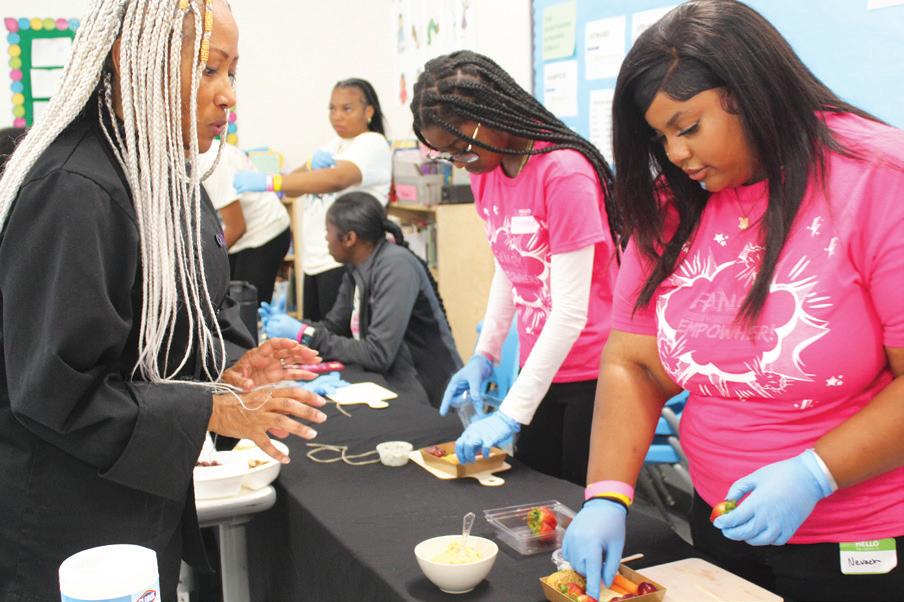
The workshops ranged from arts activities to STEM experiments, tips and tricks on how to eat healthy, and how to design brand logos! One such experiment middle school girls took part in was extracting DNA from strawberries to journey into the basics of DNA and nature’s blueprint, led by DeTour Empower's very own Joshiery Torres. Other workshops that sparked interest were the “You Too Can Eat Healthy!” workshop led by Chef Marúkah and “Crafting Impact: Building Your Own Youth Movement Club & Nonprofit Edition” workshop led by Nhyira Bawua.
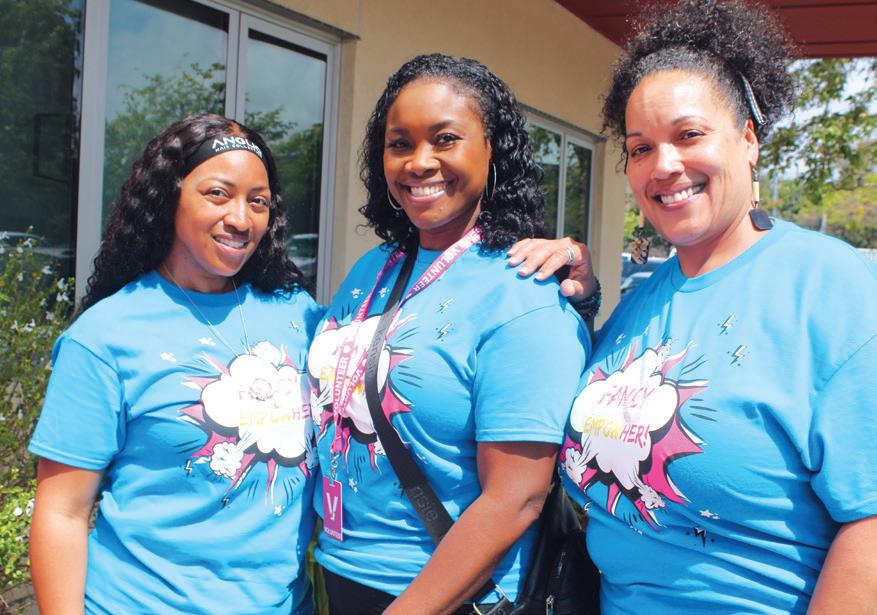
Marúkah put together a workshop that gave teen girls tips and tricks for creating and arranging charcuterie boards, pairing flavors and health to stray them away from eating junk food when they get to college. Nhyira Bawua’s workshop unleashed high school girls’ inner changemakers by centering her workshop around creating brand logos for their own youth club or nonprofit in the future! Other workshops included arts and crafts for young elementary school girls, discussing potential bar-


riers as young Black women for middle school students, and going over healthy communication strategies and boundaries for parents, offering a supportive space to share the experiences and journeys of parenthood. The Expo gave young girls, teen girls, and their parents something to look forward to, as well as the opportunity to learn something new and bring home ideas and perspectives of how to go about life and become leaders in their own communities!
 By Darrel Wheeler
By Darrel Wheeler
Mr. Roosevelt Brown with Reading Literacy Learning Inc. held their annual free children’s book giveaway at Balboa Park’s Organ Pavillion. On the last Saturday of April, Mr. Brown and his band of supporters celebrated 40 years of exemplary kindness.

“My dad, Mr. Brown, including my mother, have been doing this for years,” said son and event emcee Jamarr Brown. “I remember when Pops would have book parties in our backyard
in Emerald Hills and that led to various venues all over town, including ECC’s campus.”
“The event got so popular he had to look for a bigger place! That’s how we landed in Balboa Park. This is the perfect place, we’ve been coming here for close to twenty years,” con tinued Brown.
The young dream ers and information seekers were allowed two free books each to compliment their book shelves. The attendees were also treated to some live entertainment featuring








som einteresting dance groups with their lively routines. They were also able to indulge in a buffet of free snacks!
“I hope we inspired some kids, teachers, and parents today to encourage reading because reading is so important. Also thanks to all of

the
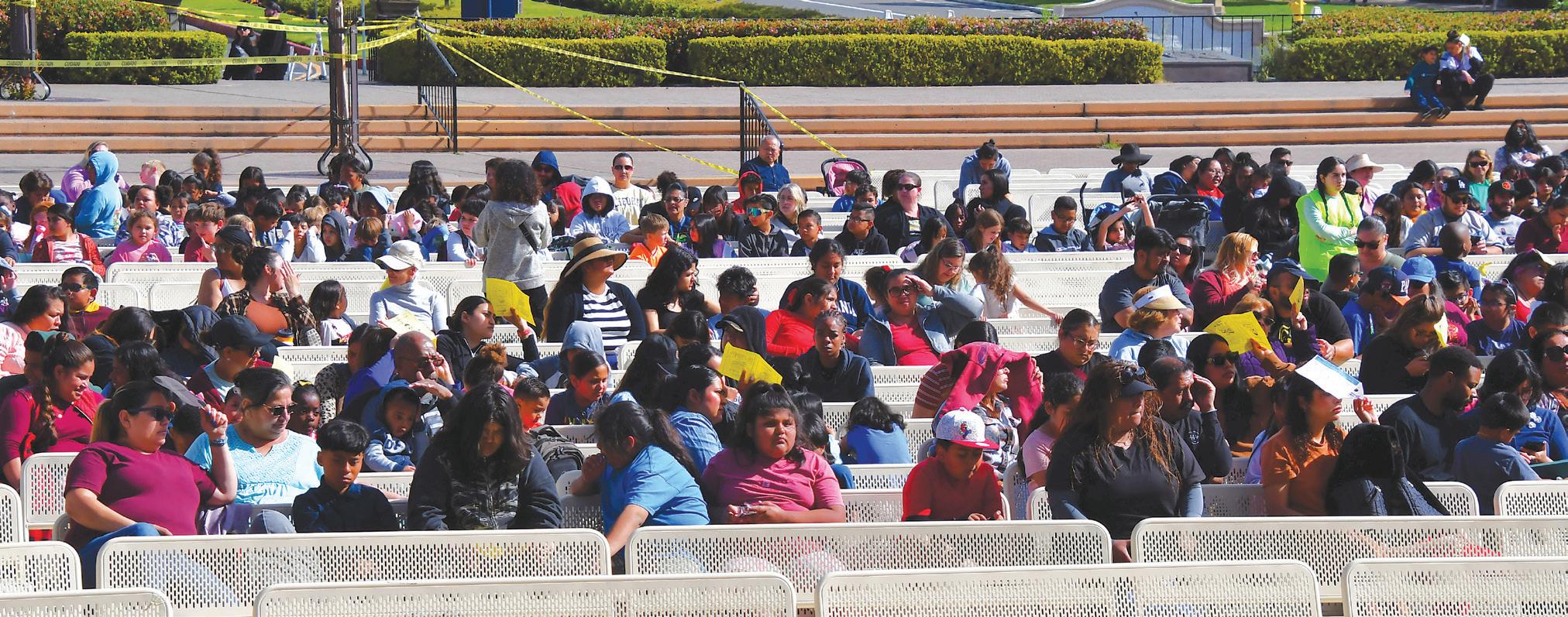
had a
shared.








 By Aryka Randall Contributing Writer
By Aryka Randall Contributing Writer
On April 27th, the community of Linda Vista came together to host their 39th Annual Multicultural Fair and Parade which took place between Genesee Avenue and the 6900 block of Linda Vista Road. The parade has become a staple in the community and provides locals with a sense of pride and happiness that can only come from bringing people from different walks of life together.
The parade featured a number of groups in the city including students from Francis Parker High School, Bayside Community Center, students in ROTC, students and faculty from USD, marching bands, and the Community Builders of Linda Vista.

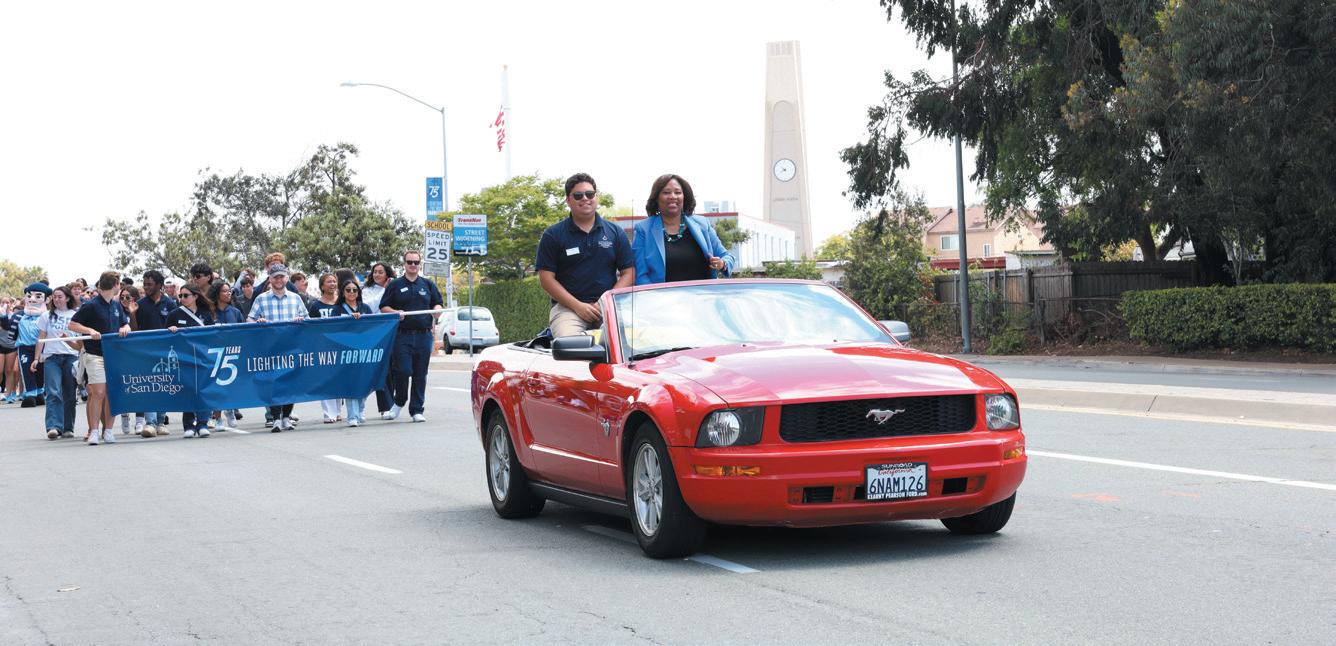


There were also special appearances made by County Supervisor Monica Montgomery Steppe, Mrs. World Alms, and Miss Vietnam which were all empowering and encouraging.
One of the highlights of this particular parade is the opportunity they give BIPOC communities to showcase their culture. Several of the people involved in the parade wore traditional attire to represent their heritage, and other groups performed dances and songs to celebrate their countries.
The parade route spanned almost one mile in length and ended with the multicultural fair for the community to enjoy. Food, music, and heritage set the tone for the day and it was clear the community has embraced the annual parade for the long haul.



Join us in paying it forward – from job shadowing to guest speaking to intern opportunities, there are countless ways for Southwestern College alumni to ignite the path for future generations.



Ki
ds who have an abusive relationship with their parents have a higher risk of worse heart health as adults, a new study reveals. However, children who have positive childhood relationships score 25 percent higher in heart health later in life.
household organization.
The final study, published in the journal Circulation: Cardiovascular Quality and Outcomes, found that an abusive childhood relationship was associated with 13 percent lower odds of attaining a high heart health score.
In contrast, a positive relationship between child and caregiver was associated with 12 percent higher odds of reaching the highest cardiovascular health score.

Researchers in the United States examined 2,074 adults between the ages of 18 and 30 over a 20-year period in order to establish the links between childhood experience and cardiovascular health. They collected data on diets, exercise, smoking, cholesterol, blood pressure, and weight to measure heart health, and gave out questionnaires about experiences during childhood. These included questions on emotional and physical abuse, affection from caregivers, levels of love and care from adults, substance abuse in the home, and
Results also showed that even the smallest differences in childhood experiences had an impact, with those scoring just one unit higher on the ‘risky family environment’ questionnaire having four percent less chance of attaining the optimum heart health score.
It comes after 59 percent of US adults reported at least one adverse childhood experience in a 2018 survey carried out by the American Heart Association.
Lead author Dr. Robin Ortiz, an assistant professor at New York University, said: “Safe, stable, and nurturing caregiver relationships during childhood may increase the chances of optimal heart health as an adult, while adverse family
experiences during childhood may increase the odds of poor cardiovascular health as an adult. She added that this means healthcare professionals should always consider the health and well-being of a household when addressing cardiovascular health.
The research paper also found that high levels of warmth and affection from caregivers did not protect against low cardiovascular health scores as adults if abuse still occurred. “This suggests that the lack of stability in a caregiver relationship, in other words, the potential to experience abuse and warmth with unpredictability for either, may be as harmful as exposure to high rates of abuse without protective factors, ” explained Dr. Ortiz.
The study argues that having a low salary as an adult may introduce additional adversity throughout their life, which could amplify the experience of a difficult childhood. In these cases, it can be difficult to establish the exact impact that a relationship between a caregiver and a child has on heart health.
Collaborators Dr. Shakira Suglia and Dr. Ayana April-Sanders added that future studies should also consider whether interventions that strengthen relationships between children and their caregivers could promote positive cardiovascular health over their lives.
Teachers across the country are grappling with whether to view AI tools like ChatGPT as friend or foe in the classroom. It can be both.
In the study, we asked college students to brainstorm – without technology – all the ways a paper clip can be used. A month later, we asked them to do the same, but using ChatGPT. We found that AI can be a useful brainstorming tool, quickly generating ideas that can spark creative exploration. But there are also potential negative effects on students’ creative thinking skills and self-confidence. While students reported that it was helpful to “have another brain,” they also felt that using AI was “the easy way out” and didn’t allow them to think on their own.
Why it matters
Other research has shown that AI
can also serve as a nonjudgmental partner for brainstorming, which can prompt a free stream of ideas they might normally withhold in a group setting. The downside of brainstorming with AI was that some students voiced concerns about overreliance on the technology, fearing it might undermine their own thoughts and, consequently, confidence in their creative abilities. Some students reported a “fixation of the mind,” meaning that once they saw the AI’s ideas, they had a hard time coming up with their own.
What still isn’t known
The essential tasks of defining problems and critically evaluating ideas still rely heavily on human input. The creative process typically involves three phases, such as problem identification, idea generation and evaluation. AI shows promise in aiding students in the idea generation phase of the creative process, according to our study. However,
the current generation of AI, such as ChatGPT-3, lacks the capacity for defining the problem and refining ideas into something actionable.
AI’s growing role in education brings many advantages, but keeping the human element at the forefront is crucial.
Some students also questioned the originality of ideas generated by AI. Our research supported these hunches. We noted that while using ChatGPT improved students’ creative output individually, the AI ideas tended to be repetitive overall. This is likely due to generative AI recycling existing content rather than creating original thought.
What’s next
Content ownership, plagiarism and false or misleading information are among the current challenges for implementing AI in education. As generative AI gains popularity, schools are pressed to set

In observance of Child Abuse Prevention Month, a beautiful pinwheel garden was on display during a press conference today in the Waterfront Park. 400 pinwheels were placed in the lawn to represent the 400 investigations weekly of children in San Diego County who may be victims of child abuse and neglect. Approximately fifteen percent of those investigations become active cases.
Chairwoman Nora Vargas, Promises2Kids and the County’s Child and Family Well Being Department teamed up for the annual event to raise awareness about child safety, early intervention and the importance of families and communities working together to protect our children.
During 2022-2023, the child abuse hotline received over 39,000 calls to
report possible abuse and neglect. More than 20,000 of those reports were investigated. Child abuse and neglect can cause long-term psychological, emotional, and physical effects that have lasting consequences for victims.
The County’s Child and Family Well Being Department is changing the way children, youth and families are supported so they can be successful. Through partnerships and strong relationships, prevention is the priority. The hope is that early intervention, education and easy access to critical resources will keep families together and stop children from ever needing to enter the child welfare service system.
Child abuse and neglect are preventable. If you believe a child you know is experiencing abuse or neglect, contact the County’s Child Abuse Hotline at 858-560-2191 or 800-344-6000. You can also call 2-1-1 San Diego.

guidelines to ensure these tools are used responsibly. Some states, such as California and Oregon, have already developed guidelines for AI in education. Ethical considerations are vital for a positive relationship between creativity and AI.
Our team will continue to research the effect of AI on creativity, explor-
ing its impact on agency, confidence and other phases of the creative process. AI in education is not just about the latest technology. It’s about shaping a future where human creativity and technological advancement progress hand in hand.
Originally published on The Conversation.
What You Need to Know:
• A person with any of the medical conditions listed below is more likely to get very sick with COVID-19.
• The list below does not include all possible conditions that put you at higher risk of severe illness from COVID-19.
• I f you have symptoms consistent with COVID-19 and you are aged 50 years or older OR are at high risk of getting very sick, you may be eligible for treatment.
• Contact your healthcare provider and start treatment within the first 5-7 days after you first develop symptoms. You can also visit a Test to Treat location.
• Staying up to date with COVID-19 vaccines and following preventive measures for COVID-19 are important.

• S ome people who are immunocompromised, or people with weakened immune systems, may get additional doses of COVID-19 vaccine.
Medical Conditions of Increased Risk:
• Cancer
• Chronic kidney disease
• Chronic lung diseases
• Cystic fibrosis
• Dementia or other neurological conditions
• Diabetes (type 1 or type 2)
• Disabilities
• Heart Conditions
• HIV Infection
• Immunocompromised condition or weakened immune system
• Mental Health Conditions
• Overweight and Obesity
• Physical inactivity
• Pregnancy
• Sickle cell disease or thalassemia
• Smoking, current or former
• Solid organ or blood stem cell transplant
• Stroke or Cerebrovascular disease
• Substance use disorders
• Tuberculosis
In addition:
Studies have shown people in racial and ethnic minority groups are often younger when they develop chronic medical conditions and may be more likely to have more than one medical condition, dying at younger ages.
If you have a medical condition, learn more
website: cdc.gov/coronavirus.
Source: CDC

5/2, 5/9, 5/16, 5/23
FICTITIOUS BUSINESS NAME STATEMENT 2024-9007854
Fictitious business name(s): Barker Brand Renovations
Barker Brand Real Estate and Renovation Located at: 631 Paul St. Escondido, CA 92027 County of San Diego
This business is conducted by:
A Limited Liability Company
The first day of business was: 03/11/2024
This business is hereby Barker Brand Renovations LLC 631 Paul St. Escondido, CA 92027
This statement was filed with the Recorder/County Clerk of San Diego County on April 10, 2024
This fictitious business name will expire on April 10, 2029 5/2, 5/9, 5/16, 5/23
FICTITIOUS BUSINESS NAME STATEMENT 2024-9008374
Fictitious business name(s): Ariane Thorne Design Located at: 4500 Panorama Drive La Mesa, CA 91941
County of San Diego
This business is conducted by: An Individual
The first day of business was: 05/30/2014
be received no later than the date and time noted in the solicitation which can be found at the following site: City of San Diego's Electronic Proposal Site – PlanetBids at: https://vendors.planetbids.co m/portal/17950/portal-home.
Claudia Abarca, Director Purchasing & Contracting Department Thursday, April 25, 2024 5/2/24 CNS-3806705# VOICE & VIEWPOINT NEWS
This business is hereby Ariane Herwig
4500 Panorama Drive La Mesa, CA 91941
This statement was filed with the Recorder/County Clerk of San Diego County on April 18, 2024
This fictitious business name will expire on April 18, 2029 5/2, 5/9, 5/16, 5/23
FICTITIOUS BUSINESS NAME STATEMENT 2024-9007314
Fictitious business name(s): Xynth Audio Located at:
13223 Black Mountain Rd. STE 1 PMB 1034 San Diego, CA 92129-2699
County of San Diego
This business is conducted by:
An Individual
The first day of business was: 10/01/2022
This business is hereby Mark Samuel Muranov
13223 Black Mountain Rd. STE 1 PMB 1034 San Diego, CA 92129-2699
This statement was filed with the Recorder/County Clerk of San Diego County on April 04, 2024
This fictitious business name will expire on April 04, 2029 5/2, 5/9, 5/16, 5/23
FICTITIOUS BUSINESS NAME STATEMENT 2024-9007929
Fictitious business name(s): Lodos SPA Located at: 1041 Market Street, Suite 165 San Diego, CA 92101 County of San Diego
This business is conducted by:
A Limited Liability Company
The first day of business was: 04/11/2024
This business is hereby Wellness Wonders Spa LLC 1041 Market Street, Suite 165 San Diego, CA 92101 State of Incorporation/ Organization: California
This statement was filed with the Recorder/County Clerk of San Diego County on April 11, 2024
This fictitious business name will expire on April 11, 2029 5/2, 5/9, 5/16,
This business is conducted by: A Married Couple
The first day of business was: 08/01/2018
This business is hereby Celio Cesar Leon Aguayo 4268 Wightman St. San Diego, CA 92105
Edith Leon 4268 Wightman St. San Diego, CA 92105
This statement was filed with the Recorder/County Clerk of San Diego County on April 23, 2024
This fictitious business name will expire on April 23, 2029 4/25, 5/2, 5/9, 5/16
FICTITIOUS BUSINESS NAME STATEMENT 2024-9007825
Fictitious business name(s):
Royal Spa Located at: 1985 National Ave. Unit #1125 San Diego, CA 92113 County of San Diego
This business is conducted by:
A Limited Partnership
The first day of business was: 03/10/2024
This business is hereby Guiying Yu 6143 University Ave. San Diego, CA 92115
Ping Yan Liu 6143 University Ave. San Diego, CA 92115
This statement was filed with the Recorder/County Clerk of San Diego County on April 10, 2024
This fictitious business name will expire on April 10, 2029 4/25, 5/2, 5/9, 5/16
FICTITIOUS BUSINESS NAME STATEMENT 2024-9008677
Fictitious business name(s): Evolve Coaching Solutions Located at: 1335 Borrego Springs Rd. Chula Vista, CA 91915 County of San Diego
This business is conducted by: An Individual Registrant has not yet begun to transact business under the name(s) above This business is hereby Zykina Stewart 1335 Borrego Springs Rd. Chula Vista, CA 91915
This statement was filed with the Recorder/County Clerk of San Diego County on April 22, 2024
This fictitious business name will expire on April 22, 2029 4/25, 5/2, 5/9, 5/16
FICTITIOUS BUSINESS NAME STATEMENT 2024-9008615
Fictitious business name(s): Ramirez Towing Located at: 805 51 St. San Diego, CA 92114 County of San Diego
This business is conducted by: An Individual Registrant has not yet begun to transact business under the name(s) above
This business is hereby Evelia Molina 805 51 St. San Diego, CA 92114
This statement was filed with the Recorder/County Clerk of San Diego County on April 22, 2024 This fictitious business name will expire on April 22, 2029 4/25, 5/2, 5/9, 5/16
FICTITIOUS BUSINESS NAME STATEMENT 2024-9008267
Fictitious business name(s): Unfamiliar Ways Located at: 4827 59th Street San Diego CA 92115 County of San Diego
This business is conducted by: An Individual Registrant has not yet begun to transact business under the name(s) above This business is hereby Jeannel Elizabeth King 4827 59th Street
San Diego CA 92115
This statement was filed with the Recorder/County Clerk of San Diego County on April 17, 2024
This fictitious business name will expire on April 17, 2029 4/25, 5/2, 5/9, 5/16
FICTITIOUS BUSINESS NAME STATEMENT 2024-9007511
Fictitious business name(s): SDGoodFlow Located at: 6509 Hyman Pl. San Diego, CA 92139 County of San Diego
This business is conducted by:
An Individual
The first day of business was: 03/20/2024
This business is hereby Mark Saucier Jr. 6509 Hyman Pl. San Diego, CA 92139 State of Incorporation/ Organization: SDGoodFlow
This statement was filed with the Recorder/County Clerk of San Diego County on April 05, 2024
This fictitious business name will expire on April 05, 2029 4/25, 5/2, 5/9, 5/16
FICTITIOUS BUSINESS NAME STATEMENT 2024-9008332
Fictitious business name(s): Yanely Cleaning
Services Located at:
298 Chambers St. El Cajon, CA 92020
County of San Diego
This business is conducted by:
An Individual Registrant has not yet begun to transact business under the name(s) above This business is hereby Yanely Leon
298 Chambers St. El Cajon, CA 92020
This statement was filed with the Recorder/County Clerk of San Diego County on April 17, 2024
This fictitious business name will expire on April 17, 2029 4/25, 5/2, 5/9, 5/16
FICTITIOUS BUSINESS NAME STATEMENT 2024-9007864
Fictitious business name(s): Empire Fencing Located at: 3040 Alta View Drive San Diego, CA 92139 County of San Diego PO Box 3904249 San Diego, CA 92149 County of San Diego This business is conducted by: An Individual
The first day of business was: 01/30/2024 This business is hereby Abraham Monroy PO Box 3904249 San Diego, CA 92149
This statement was filed with the Recorder/County Clerk of San Diego County on April 10, 2024
This fictitious business name will expire on April 10, 2029 4/25, 5/2, 5/9, 5/16
FICTITIOUS BUSINESS NAME STATEMENT 2024-9008310
Fictitious business name(s): Raise the Bar SD LLC Located at: 5252 Orange Ave. Unit 313 San Diego, CA 92115
County of San Diego
This business is conducted by: A Limited Liability Company
Registrant has not yet begun to transact business under the name(s) above
This business is hereby Raise the Bar SD LLC 5252 Orange Ave. Unit 313 San Diego, CA 92115
This statement was filed with the Recorder/County Clerk of San Diego County on April 17, 2024
This fictitious business name will expire on April 17, 2029 4/25, 5/2, 5/9, 5/16
FICTITIOUS BUSINESS
Classified ads can be placed in person, by phone, fax, or email Monday-Thursday 9:30 a.m. - 3:30 p.m. P:619-266-2233 F:619-266-0533 E:ads@sdvoice.info

NAME STATEMENT
2024-9008396
Fictitious business name(s): EZScoop&Go
Located at:
7420 Boston Ct. La Mesa, CA 91941 County of San Diego
This business is conducted by:
A Married Couple
The first day of business was: 04/18/2024
This business is hereby Vutha Seng
7420 Boston Ct. La Mesa, CA 91941
Sandra Seng
7420 Boston Ct. La Mesa, CA 91941
This statement was filed with the Recorder/County Clerk of San Diego County on April 18, 2024
This fictitious business name will expire on April 18, 2029 4/25, 5/2, 5/9, 5/16
FICTITIOUS BUSINESS NAME STATEMENT 2024-9008023
Fictitious business name(s):
Lasermaxx Engraving Located at: 3927 Clairemont Masa Blvd San Diego, CA 92117 County of San Diego
This business is conducted by:
A Married Couple
Registrant has not yet begun to transact business under the name(s) above
This business is hereby Tarsicio Juarez
3927 Clairemont Masa Blvd San Diego, CA 92117
Claudia Martinez Soliz
3927 Clairemont Masa Blvd San Diego, CA 92117
This statement was filed with the Recorder/County Clerk of San Diego County on April 12, 2024
This fictitious business name will expire on April 12, 2029 4/25, 5/2, 5/9, 5/16
FICTITIOUS BUSINESS NAME STATEMENT 2024-9008173
Fictitious business name(s):
La Maestra Community Health CentersRea Avenue Located at: 181 Rea Avenue El Cajon, CA 92020 County of San Diego
This business is conducted by:
A Corporation
The first day of business was: 07/09/1991
This business is hereby La Maestra Family Clinic, INC
4060 Fairmount Avenue San Diego, CA 92105
This statement was filed with the Recorder/County Clerk of San Diego County on April 16, 2024
This fictitious business name will expire on April 16, 2029 4/25, 5/2, 5/9, 5/16
FICTITIOUS BUSINESS NAME STATEMENT 2024-9008174
Fictitious business name(s): La Maestra Community Health Centers4074 Fairmount Located at: 4074 Fairmount Avenue San Diego, CA 92105 County of San Diego
This business is conducted by: A Corporation
The first day of business was: 07/09/1991
This business is hereby La Maestra Family Clinic, INC
4060 Fairmount Avenue San Diego, CA 92105
This statement was filed with the Recorder/County Clerk of San Diego County on April 16, 2024
This fictitious business name will expire on April 16, 2029 4/25, 5/2, 5/9, 5/16
FICTITIOUS BUSINESS NAME STATEMENT 2024-9008013
Fictitious business name(s): Dr. Rude Located at: 4340 44th Street Unit 430
the name(s) above
This business is hereby Nawied Faqirzai 4340 44th Street Unit 430 San Diego, CA 92115
This statement was filed with the Recorder/County Clerk of San Diego County on April 12, 2024
This fictitious business name will expire on April 12, 2029 4/18, 4/25, 5/2, 5/9
FICTITIOUS BUSINESS NAME STATEMENT 2024-9007509
Fictitious business name(s): The Waggle Dance
The Waggle Dance Shop
The Waggle Dance Shoppe
Waggle Dance
Waggle Dance Shop
Waggle Dance Shoppe Located at: 572 61st Street San Diego, CA 92114
County of San Diego
This business is conducted by:
An Individual Registrant has not yet begun to transact business under the name(s) above
This business is hereby registered by the following: Bernadette Joyce O. WinterVillaluz 572 61st Street San Diego, CA 92114
This statement was filed with the Recorder/County Clerk of San Diego County on April 05, 2024
This fictitious business name will expire on April 05, 2029 4/18, 4/25, 5/2, 5/9
FICTITIOUS BUSINESS NAME STATEMENT 2024-9007607
Fictitious business name(s): A Time For Peac3e Located at: 3060 53rd St. #19 San Diego, CA 92105
County of San Diego
This business is conducted by: An Individual Registrant has not yet begun to transact business under the name(s) above
This business is hereby registered by the following: Eleanor Renee Rodriguez 3060 53rd St. #19 San Diego, CA 92105
This statement was filed with the Recorder/County Clerk of San Diego County on April 08, 2024
This fictitious business name will expire on April 08, 2029 4/18, 4/25, 5/2, 5/9
FICTITIOUS BUSINESS NAME STATEMENT 2024-9007373
Fictitious business name(s): PetValley Located at: 9527 Jamacha Blvd. Spring Valley, CA 91977 County of San Diego
This business is conducted by: A Corporation
The first day of business was: 04/04/2024
This business is hereby registered by the following: PetValley INC. 9527 Jamacha Blvd. Spring Valley, CA 91977
This statement was filed with the Recorder/County Clerk of San Diego County on April 04, 2024
This fictitious business name will expire on April 04, 2029 4/18, 4/25, 5/2, 5/9
FICTITIOUS BUSINESS NAME STATEMENT 2024-9006967
Fictitious business name(s): Ezride Shuttle Located at: 475 Orange Avenue #41 Chula Vista, CA 91911
County of San Diego
This business is
conducted by: A Limited Liability Company
Registrant has not yet begun to transact business under the name(s) above
This business is hereby registered by the following: Successful Transportation LLC 475 Orange Avenue, Space 41 Chula Vista, CA 91911 This statement was filed with the Recorder/County Clerk of San Diego County on March 28, 2024
This fictitious business name will expire on March 28, 2029 4/18, 4/25, 5/2, 5/9
FICTITIOUS BUSINESS NAME STATEMENT 2024-9007590
Fictitious
FICTITIOUS BUSINESS NAME STATEMENT
Fictitious
Hua Located at: 8885 Rio San Diego Dr. STE 357 San Diego, CA 92108 County of San Diego This business is conducted by: An Individual The first day of business was: 01/03/2017 This business is hereby registered by the following: Elizabeth Y Nhi Thi Hua 8885 Rio San Diego Dr. STE 357 San Diego, CA 92108 This statement was filed with the Recorder/County Clerk of San Diego County on February 29, 2024 This fictitious business name will expire on February 28, 2029 4/11, 4/18, 4/25, 5/2
FICTITIOUS BUSINESS NAME STATEMENT 2024-9006580
Fictitious business name(s): Insight Research and Evaluation Consulting Located at: 2842 Jarvis St. San Diego, CA 92106 County of San Diego This business is conducted by: An Individual Registrant has not yet begun to transact business under the name(s) above This business is hereby registered by the following: Sarah Preisz Hiller-Venegas 2842 Jarvis St. San Diego, CA 92106 This statement was filed with the Recorder/County Clerk of San Diego County on March 25, 2024 This fictitious business name will
9:00 a.m. on THURSDAY, MAY 9, 2024 outside the main office of Hage Elementary School , 9750 Galvin Avenue, San Diego, CA 92126. Upon completion of the first site, contractors shall proceed immediately to: University City High School , 6949 Genesee
at the District’s online Planroom at sandiegousdplans.com All bids must be received electronically via PlanetBids before 1:00 p.m. on MAY 22, 2024. Prime contractors interested in submitting a bid must go to tinyurl.com/SDUSD-PlanetBids then search under “Bid Opportunities” for “Invitation number” CC24-1141-52-00-00 Single Point of Entry at 5 Sites. For new vendors, please register under “New Vendor Registration.” The project estimate is between $245,000 and $370,000, inclusive of allowances. This is not a PSA project and does not require prequalification. The District requires that Bidders possess any of the following classification(s) of California State Contractors License(s), valid and in good standing, at the time of bid opening and contract award: B, or other appropriate license, subject to District approval. SAN DIEGO UNIFIED SCHOOL DISTRICT, George A. Harris III, Director, Fiscal Controls and Information Systems, Facilities Planning and Construction CC24-1141-52-00-00
REQUEST
WSP USA is one of the world’s leading engineering consulting firms with an office in San Diego. In preparation for future projects, WSP is seeking to prequalify local subconsultant firms to support the City of
why the petition should not be granted. If no written objection is timely filed, the court may grant the petition without a hearing.
NOTICE OF HEARING
Date: May 14, 2024 Time: 8:30 A.M. Dept. C-61
(To appear remotely, check in advance of the hearing for information about how to do so on the court's website. To find your court's website go to www.courts.ca.gov/find-mycourt.htm)
NO HEARING WILL OCCUR ON THE DATE SPECIFIED IN THE ORDER TO SHOW CAUSE.
The court will review the documents filed as of the date specified on the Order to Show Cause for Change of Name (JC Form #NC-120).
If all requirements for a name change have been met as of the date specified, and no timely written objection has been received (required at least two court days before the date specified), the Petition for Change of Name (JC Form #NC-100) will be granted without a hearing. One copy of the Order Granting the Petition will be mailed to the petitioner.
To change a name on a legal document, including a birth certificate, social security card, driver license, passport, and other identification, a certified copy of Decree Changing Name (JC Form #NC-130) or Decree
Changing Name and Order Recognizing Change of Gender and for Issuance of New Birth Certificate (JC Form #NC-230) may be required. Contact the agency(ies) who issue the legal document that needs to be changed, to determine if a certified copy is required.
A certified copy of Decree
Changing Name (JC Form #NC-130) or Decree
Changing Name and Order
Recognizing Change of Gender and for Issuance of New Birth Certificate (JC Form #NC-230) may be obtained from the Civil Business Office for a fee. Petitioners who are seeking a change of name under the Safe at Home program may contact the assigned department for the information on obtaining certified copies.
If all the requirements have not been met as of the date specified, the court will mail the petitioner a written order with further directions.
If a timely objection is filed, the court will set a hearing date and contact the parties by mail with further directions.
A RESPONDENT
OBJECTING TO THE NAME CHANGE MUST FILE A WRITTEN
OBJECTION AT LEAST TWO COURT DAYS (excluding weekends and holidays) BEFORE THE DATE SPECIFIED. Do not come to court on the specified date. The court will notify the parties by mail of a future hearing date
court at the hearing indicated below to show cause, if any, why the petition for change of name should not be granted. Any person objecting to the name changes described above must file a written objection that includes the reasons for the objection at least two court days before the matter is scheduled to be heard and must appear at the hearing to show cause why the petition should not be granted. If no written objection is timely filed, the court may grant the petition without a hearing.
NOTICE OF HEARING
Date: May 22, 2024
Time: 8:30 A.M. Dept. C-61
(To appear remotely, check in advance of the hearing for information about how to do so on the court's website. To find your court's website go to www.courts.ca.gov/find-mycourt.htm)
NO HEARING WILL OCCUR ON THE DATE SPECIFIED IN THE ORDER TO SHOW CAUSE.
The court will review the documents filed as of the date specified on the Order to Show Cause for Change of Name (JC Form #NC-120).
If all requirements for a name change have been met as of the date specified, and no timely written objection has been received (required at least two court days before the date specified), the Petition for Change of Name (JC Form #NC-100) will be granted without a hearing. One copy of the Order Granting the Petition will be mailed to the petitioner.
To change a name on a legal document, including a birth certificate, social security card, driver license, passport, and other identification, a certified copy of Decree Changing Name (JC Form #NC-130) or Decree Changing Name and Order Recognizing Change of Gender and for Issuance of New Birth Certificate (JC Form #NC-230) may be required. Contact the agency(ies) who issue the legal document that needs to be changed, to determine if a certified copy is required.
A certified copy of Decree Changing Name (JC Form #NC-130) or Decree Changing Name and Order Recognizing Change of Gender and for Issuance of New Birth Certificate (JC Form #NC-230) may be obtained from the Civil Business Office for a fee. Petitioners who are seeking a change of name under the Safe at Home program may contact the assigned department for the information on obtaining certified copies.
If all the requirements have not been met as of the date specified, the court will mail the petitioner a written order with further directions.
If a timely objection is filed, the court will set a hearing date and contact the parties by mail with further directions.
ORDER TO SHOW CAUSE- RECOGNITION OF MINOR'S CHANGE OF GENDER AND ISSUANCE OF NEW BIRTH CERTIFICATE AND CHANGE OF NAME
Petitioner or Attorney: Gretchen Anne Davis, Michael Andrew Davis
1. NAME CHANGE TO ALL INTERESTED PERSONS
a. A petition has been filed seeking change of name from (minor's current name): Molly Chapin Davis to (proposed name): Hunter Chapin Davis
b. THE COURT ORDERS that any person objecting to the name change described above must file a written objection that includes the reasons for the objection within six weeks of the date this order is issued. If no written objection is timely filed, the court will grant the petition without a hearing.
2. GENDER AND SEX IDENTIFIER CHANGE
a. Petitioner(name of petitioning adult): Gretchen Anne Davis, Michael Andrew Davis filed a petition on behalf of (name of minor): Molly Chapin Davis requesting a decree recognizing that minor's gender and sex identifier is changed to (3) nonbinary and an order for issuance of a new birth certificate reflecting minor's changed gender and sex identifier.
b. THE COURT ORDERS that any living parent or, if all parents are deceased or cannot be located, all living grandparents show cause, if any, why the petition should not be granted by filing a written objection that includes any reasons for the objection within six weeks of the date this order is issued. If no written objection is timely filed, the court will grant the petition without a hearing.
INFORMATION ABOUT THE PETITIONER
1. This request is being made by (minor's present name): Molly Chapin Davis
a. parent or parents (names): Gretchen Anne Davis, Michael Andrew Davis
2. Petitioning minor either is a California resident or seeks a change to a California birth certificate.
REQUEST FOR RECOGNITION OF CHANGE OF GENDER AND SEX IDENTIFIER
5. Petitioners request a decree recognizing that minor's gender and sex identifier is changed to: c. nonbinary
REQUEST FOR CHANGE OF NAME
7. Petitioner applies for a decree to change the name of the following person:
b. Other (1) Present name (specify): Molly Chapin Davis
(2) Proposed name (specify): Hunter Chapin Davis
(3) Born on (date of birth): 08/20/2008 and presently under 18 years of age
(4) Born at (place of birth): Escondido, CA
(5) Sex (as stated on original birth certificate): Female
(6) Current residence address (street, city, county, state and zip code): 805 San Pasqual Valley, Escondido, San Diego, CA 92027
c. Reason for the name change (explain): Better match for their gender identity.
d. Relationship of the petitioner to the person whose name will be changed: (2) Parent 4/11, 4/18, 4/25, 5/2
SUPERIOR COURT OF CALIFORNIA COUNTY OF SAN DIEGO 500 3rd Ave. Chula Vista, CA 91910
Petition For Dissolution (Divorce) of: Marriage Case Number: PETITIONER: Kiara Renae Woods
RESPONDENT: Carlos Raul DiazMendez
1. LEGAL RELATIONSHIP: We are married
2. RESIDENCE REQUIREMENTS: Petitioner has been a resident of this state for at least six months and of this county for at least three months immediately preceding the filing of this Petition. (For a divorce, unless you are in the legal relationship described in 1b., at least one of you must comply with this requirement.)
3. STATISTICAL FACTS (1)Date of marriage (specify): December 22, 2019
(2)Date of separation (specify): August 31, 2020
(3)Time from date of marriage to date of separation (specify): 9 months
4. MINOR CHILDREN There are no minor children
5. LEGAL GROUNDS (Family Code sections 22002210, 2310-2312): a. Divorce of the marriage or domestic partnership based on 1.irreconcilable differences
8:30 A.M. Dept. 61
No hearing will occur on above date.
(To appear remotely, check in advance of the hearing for information about how to do so on the court's website. To find your court's website go to www.courts.ca.gov/find-mycourt.htm)
The address of the court is: 330 W. Broadway
San Diego, CA 92101 4/18, 4/25, 5/2, 5/9
SUPERIOR COURT OF CALIFORNIA 330 West Broadway San Diego, CA 92101 Hall of Justice
37-2024-00014572CU-PT-CTL
Petitioner or Attorney: Davion Avant Simpson-Kern
To All Interested Persons: Petitioner Davion Avant Simpson-Kern filed a petition with this court for a decree changing names as follows:
PRESENT NAME: Davion Avant Simpson-Kern
PROPOSED NAME: Davion Avant Avalos-Kern
THE COURT ORDERS that all persons interested in this matter appear before this court at the hearing indicated below to show cause, if any, why the petition for change of name should not be granted. Any person objecting to the name changes described above must file a written objection that includes the reasons for the objection at least two court days before the matter is scheduled to be heard and must appear at the hearing to show cause
Any Petition for the name change of a minor that is signed by only one parent must have this Attachment served along with the Petition and Order to Show Cause, on the other nonsigning parent, and proof of service must be filed with the court.
The address of the court is:
A RESPONDENT OBJECTING TO THE NAME CHANGE MUST FILE A WRITTEN OBJECTION AT LEAST TWO COURT DAYS (excluding weekends and holidays) BEFORE THE DATE SPECIFIED. Do not come to court on the specified date. The court will notify the parties by mail of a future hearing date
Any Petition for the name change of a minor that is signed by only one parent must have this Attachment served along with the Petition and Order to Show Cause, on the other nonsigning parent, and proof of service must be filed with the court.
The address of the court is:
9. Petitioners request that the court decree that, to conform to minor's gender identity, the minor's name is changed to (proposed name): Hunter Chapin Davis
a. Petitioners provide the additional required information in support of this request for name change on the attached Name and Information About the Person Whose Name Is to Be Changed (form NC-110).
b. This is the right court for the petition to change name because minor (1) is a resident of this county.
c. Petitioners request that the court issue an order on form NC-520 directing all interested persons to file written objections to show cause why the petition for change of name should not be granted. (Form NC520 is filed along with this document.)
10. Petitioners request the court to order that a new birth certificate be issued reflecting the recognition of gender changed and any name change sought by this petition.
NAME AND INFORMATION ABOUT THE PERSON WHOSE NAME IS TO BE CHANGED Attachment to Petition (form NC-100, form NC-300, form
8. SPOUSAL OR DOMESTIC PARTNER SUPPORT b. Terminate (end) the court's ability to award support to Petitioner & Respondent
9. SEPARATE PROPERTY Confirm as separate property the assets and debts in Property Declaration (form FL -160)
10. COMMUNITY AND QUASI- COMMUNITY PROPERTY b. Determine rights to community and quasicommunity assets and debts. All such assets and
-160)
Date Filed: September 28, 2023 8:oo AM By: J. Rennen,




& VIEWPOINT
Black Enterprise (BE) reported recently that Black women entrepreneurs are increasing their visibility in microbusinesses.
The online business news source documented data from a Venture Forward report of 6,000 small businesses across the U.S. and the UK suggests that 15% of micro-businesses owned by Black entrepreneurs, 68% of those were Black-women owned.
The Venture Forward report, launched in 2018 stated, “Most of these businesses employ fewer than 10 people, classifying them as microbusinesses. Their economic impact is outsized even though they often don’t show up in traditional government statistics.”
At the top of the list of challenges respondents faced when starting their businesses, Black women stated they faced several challenges sustaining their businesses. According to the Harvard

Business Review research in 2021 found that access to capital and key resources “reinforce” the advantage of certain groups while impeding the entry and catching up of disadvantaged groups.”
As reported by BE, Giac Capital CEO James Giacopelli, in reviewing research from Forbes found that Black women have been successful in entrepreneurship by also acquiring existing businesses.
He states, “Instead of starting a company from scratch, purchasing an existing business is more affordable and less risky. With a purchased business, you can also acquire valuable copyrights and patents.” Equally important, Giacopelli suggests, “You can also lead a declining business in the right direction with your creative ideas,” highlighting different, yet viable, routes to success.
A new study identified Black-owned businesses and found Americans are willing to pay more to close the racial wealth gap
By Gregory Stevenson WORD IN BLACKIn news that may be surprising to many, unprecedented national research released recently suggests that most Americans are willing to pay a premium price for products and services if they know that they are helping to reduce the racial wealth gap in the U.S.
The study was cited by Fund for Social Equity, a new nonprofit that works to change the reality of the ongoing racial wealth gap through research-first, marketing-based solutions.
That gap between Black and white households continues to widen in the U.S. and now stands at $44,890 and $285,010, respectively, according to the latest research from the Board of Governors of the Federal Reserve.
Fund for Social Equity has tested a seal to identify businesses owned and operated by Blacks as a way to reduce the wealth disparity between Black and white Americans.
When asked about their purchase likelihood of a product or service at a premium price with an identifying seal:
• 47% of all Americans surveyed definitely or probably would buy, and that rises to 78% among Black Americans,
• 77% were neutral to positive on the concept, and,
• Alienation (rejection of the concept) at 23% was low.
“We approach the racial wealth gap with a marketing-first mindset and our research finds that nearly half of all Americans definitely or probably — top two boxes — would purchase at a higher price products and services identified as Black-owned,” said Mark Koide, co-founder of the Fund for Social Equity (FSE) and a life-long marketeer. “This is a potential game-changer for any business that is Black-owned and seeks to differentiate itself.”

FSE is led by an inclusive Board of Advisors also available at, which is comprised largely of marketing and nonprofit leaders who are committed to ending the racial wealth gap.
“In addition to finding large and scalable subgroups within the national general population panel which supported the distinguishing seal with top two box scores of 47%, there were very few concept rejectors,” said April Jeffries, who led the FSE team at global researcher Ipsos and serves as its global president of ethnography and immersion. “The bottom two boxes account for less than 25%. The concept is much less polarizing than we initially expected.”
Arva R. Rice, CEO of the New York Urban League, added, “The New York Urban League commends the Fund for Social Equity on its commitment to decreasing the wealth gap between Black and other Americans.”
Mark Winston Griffith, an advisor to FSE who is an award-winning journalist, professor of Community Economic Development at Pratt Institute, and co-founder of several New York-based consumer cooperatives, said, “The FSE is sharing our research and is interested in collaborating with like-minded
partners who believe the racial wealth gap can be addressed from a community-up perspective by driving more dollars to Black-owned businesses.
More than 15 business sectors were tested and everyday purchases in food and consumer products scored the highest in appeal across expenditure categories. Additional analysis provides detailed breakdowns by regions and demographics of the U.S. By region, the West South Central, Middle Atlantic, South Atlantic, Pacific, and East North Central Census divisions demonstrated greatest appeal. And among demographics, Millennials, Blacks and Democrats demonstrated the strongest interest.
The label is envisioned for use in all industries — B2B and B2C. It will also be featured at retail and employer sites as a badge indicating fulfillment and ongoing verification of the stringent FSE standards, which as tested include: Black American ownership of more than 50% of the company, and operated with more than 25% in all management positions identifying as Black American.
This article first appeared on Defender Network.

SUNRISE 06/11/1924
SUNSET 04/14/2024
Leonard Charles Perry, aka “L. Chas” and “TD,” licensed attorney in Ohio and California, died on April 14, 2024, in San Diego, nine years after the death of his beloved wife, Elinor.
Len was born on June 11, 1924, in Oberlin, Ohio, to Attorney Clyde C. and Ruth Mae Perry. Len’s family moved to Cleveland, Ohio, at age 5. He excelled at sports and in 1943, Len was Cleveland’s champion high hurdler.
Len served our country as a radio operator with the Combat Engineers in the European theater during World War II. Len finished law school, passing the Ohio Bar in 1951. He started his legal career as a Contract Specialist with the Ordnance Corps, Department of the US Army. In 1958, he was featured in Ebony Magazine’s “Speaking of People” for his accomplishments with the Cleveland Ordnance District.
In Cleveland during the 1960’s, Len was the NASA Lewis Research Center’s Contracting Officer and managed over forty administrators. Under his direction, they developed General Dynamic’s Astronomics/Convair Division’s Centaur upper-stage booster. The success of this program is looked upon as one of the Center’s stellar achievements, getting a man on the Moon! “Len Perry” was mentioned several times in NASA’s history book of the Lewis Research Center (1982).
In 1970, Len was hired by General Dynamics as the Manager of Material Contracts, Convair Division, and the family relocated to San Diego. When Len’s supervisor asked about his career objective, he replied, “What more can you do after you’ve been to the Moon?” Len took the California Bar Exam in 1973. Len’s good friend, the late federal Judge Earl B. Gilliam, swore him into the State Bar of California.
Len was a member of many organizations; Alpha Phi Alpha and Sigma Pi Phi Fraternities, National Bar Assoc., Earl B. Gilliam Bar Assoc., Honorary Deputy Sheriff’s Assoc. Board of Trustees San Diego Community College, Scholarship Award Board for the SD Air, and Space Museum.
Len was a devout believer in Christ, and he lived according to Psalm 23. Grateful for a full life, Len will forever be in the hearts of his family: daughters; Valorie Ashley and Pam Perry Smal (Frank), son Leonard “Chip” Perry Jr., grandchildren; Kimberly Michele Tharpe, Tiffany Nicole Tharpe, Mason “KC” Perry, Leonard “Chaz” Perry III, and Nicholas Andre Smal (Erin), great- grandchildren; Jelani Tharpe, Nacio DeLeon Tharpe, Lilian Eve Smal, Audra Elizabeth Smal, and Davis Christopher Smal, along with nieces, nephews, and extended family and friends.
Memorial Service Saturday, May 4, 2024, at 2:00 PM at Greenwood Mortuary 4300 Imperial Ave, San Diego, CA 92113 Salli Lynn Chapel

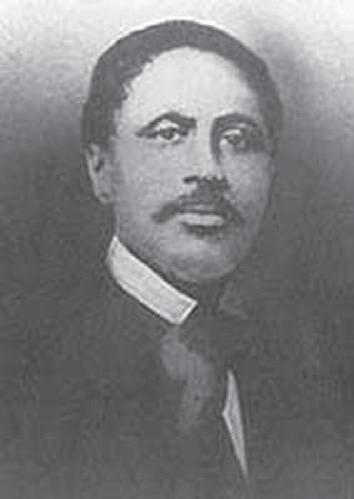
Macon Bolling Allen is believed to be the first Black man in the United States who was licensed to practice law. Allen faced a few challenges on his way to becoming a lawyer as he was refused on the grounds that he was not a citizen, though according to Maine law anyone “of good moral character” could be admitted to the bar. He then decided to apply for admission by examination. After passing the exam and earning his recommendation he was declared a citizen of Maine and given his license to practice law on July 3, 1844.
Allen passed the Massachusetts Bar Exam on May 2, 1845. Shortly afterwards he and Robert Morris, Jr., opened the first black law office in the United States. In 1873 he was appointed as a judge in the Inferior Court of Charleston and one year later was elected judge probate for Charleston County, South Carolina.He continued to practice law right until his death at age 78.
The first game of the National Negro Baseball League was played in Indianappolis on May 2nd, 1920. The league was formed by Andrew “Rube” Foster, former player and manager for various teams, who led a group of team owners to create National Negro League. Between 1931 and 1937 a number of teams were formed and disbanded, of which, the Negro American League in the East and the Negro National League in the West survived. The 1937 winners of each league met in a world series of Black Baseball. After news broadcasted about the Negro Baeball League other white baseball teams began signing many stars of the Black baseball leagues changing the face of baseball by 1976.

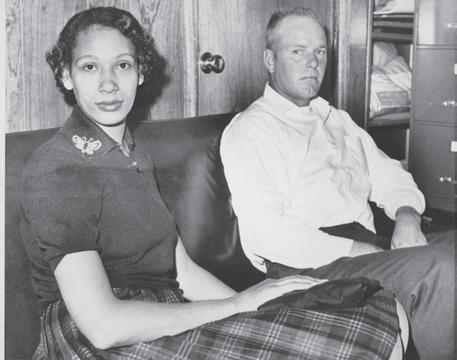
Loving v. Virginia, a legal case on interracial marriage between a “white” and a “colored” person, was unanimously struck down in 1967. Richard Loving, a white man, and Mildred Jeter, a woman of mixed African-American and Native American ancestry, traveled from Virginia to Washington D.C. to get married, as the state of Virginia prohibited interracial marriage. After returning to Virginia at the home of Mildred’s parents, police entered the Loving’s bedroom and arrested them for violating the state’s ban on interracial marriage. The Loving’s pleaded guilty and were sentenced to a year in jail. The Loving’s filed suit to overturn convictions on the grounds, it was denied, so the Loving’s wrote for a unanimous Court and Chief Justice Earl Warren reversed the Loving’s convictions. This decision invalidated laws against interracial marriage in 15 other states. They sustained a long marriage before Mildred Delores Loving’s death on May 2nd, 2008.
The family asks in lieu of flowers, please donate to Hospice Care.
he Lord is close to the brokenhearted and saves those who are crushed in spirit.
Psalm 34:18 Perry

Ac cording to the newest World Happiness Report for 2024, the United States has dropped in the worldwide happiness rankings. Released on March 20, America plunged eight spots from its previous ranking, marking the first time in the report’s 12-year history that the nation has failed to secure a position among the world’s top 20 happiest countries.
Released on the UN’s International Day of Happiness, the report, a collaborative effort among Gallup, the Oxford Wellbeing Research Centre, the UN Sustainable Development Solutions Network, and the World Happiness Report’s Editorial Board, sheds light on the shifting landscape of happiness worldwide. While perennial frontrunners like Finland and Denmark continue to dominate the top spots, the U.S. finds itself in an unfamiliar position of decline.
Historically, the pursuit of happiness has been ingrained in the American ethos, symbolizing freedom, opportunity, and prosperity. However, in recent years, several factors have been identified that could contribute to its demise. Political turmoil and the hate and confusion that has come with the candidacy and trials of the twice-impeached and four-times indicted former president Donald Trump, economic inequality, diminishing social cohesion, and a pervasive consumerism culture often undermine many Americans’ well-being. Additionally, the pressures of modern life, including work-related stress, a lack of
affordable healthcare, and political polarization, have taken a toll on mental health and overall happiness levels. Moreover, the advent of social media and digital technologies, while providing connectivity, has also been linked to increased feelings of isolation and comparison, negatively impacting subjective well-being.
The new happiness report highlights that “some countries, like Finland and Denmark, consistently rank among the world’s happiest. The U.S. isn’t one of them.”
Drawing upon data collected by the Gallup World Poll and analyzed by leading wellbeing experts, the report underscored the multifaceted nature of happiness trends. While Finland maintains its reign as the happiest nation for the seventh consecutive year, other countries, such as Serbia and Bulgaria, have witnessed significant increases in average life evaluation scores, resulting in notable climbs in the rankings. While Finland’s average life evaluation ranks it as the happiest country in the world, Afghanistan ranks as the least happy country in the world with a life evaluation of 1.721.
Breaking new ground, the report introduced separate rankings by age group, revealing differing happiness levels across generations. Notably, a significant decline in the wellbeing of Americans under 30 is what has caused the U.S. to fall in the rankings overall.
At the global level, averaged across all ages and regions, inequality of happiness has increased by more than 20% over the past dozen years. Among those born after 1980, happiness falls with each year of age.

Among those born before 1965, life evaluations rise with age.
John F. Helliwell, Emeritus Professor of Economics at the University of British Columbia and a founding editor of the World Happiness Report, emphasizes the importance of understanding these generational disparities. “There is a great variety among countries in the relative happiness of the younger, older, and inbetween populations,” he commented.
“Effective policymaking relies on solid data,” stated Jon Clifton, CEO of Gallup. “Today’s World Happiness Report attempts to bridge some of these gaps… It provides analytics and advice for evidence-based planning and policymaking,” he stated.
Jan-Emmanuel De Neve, Director of Oxford’s Wellbeing Research Centre, calls for immediate policy action in light of concerning drops in happiness among youth, adding, “To think that, in some parts of the world, children are already experiencing the equivalent of a mid-life crisis demands immediate policy action.”
Continued from page 2
Elon Musk posted on X, “DEI is just another word for racism.” Dinesh D’Souza drew a unique distinction between terms when calling Claudine Gay, Harvard’s first Black president, a “DEI hire,” saying, “affirmative action hires are merely incompetent. DEI hires are malevolent mouthpieces…” The Washington Post called liberal activist investor Bill Ackman “America’s leading anti-DEI crusader.” Florida Governor Ron Desantis said, “If you look at the way this has actual -
ly been implemented across the country, DEI is better viewed as standing for discrimination, exclusion and indoctrination.”
Cynthia Kaui, president of the San Diego Young Republicans, hopes the next generation of conservatives has a different approach, even through disagreements.
“We do care about ensuring that all types of voices are represented. Perhaps when

we get into the nitty-gritty in regards to specifics or some aspects of [DEI initiatives], there will definitely be some disagreements and there’s no shame in admitting that,” she said, “I’m personally not one of those people that thinks ‘if you’re not for me, you’re against me’... I would hope and pray that Republicans can improve their messaging on that. That’s something that I’m aiming to change with Young Republicans.”



